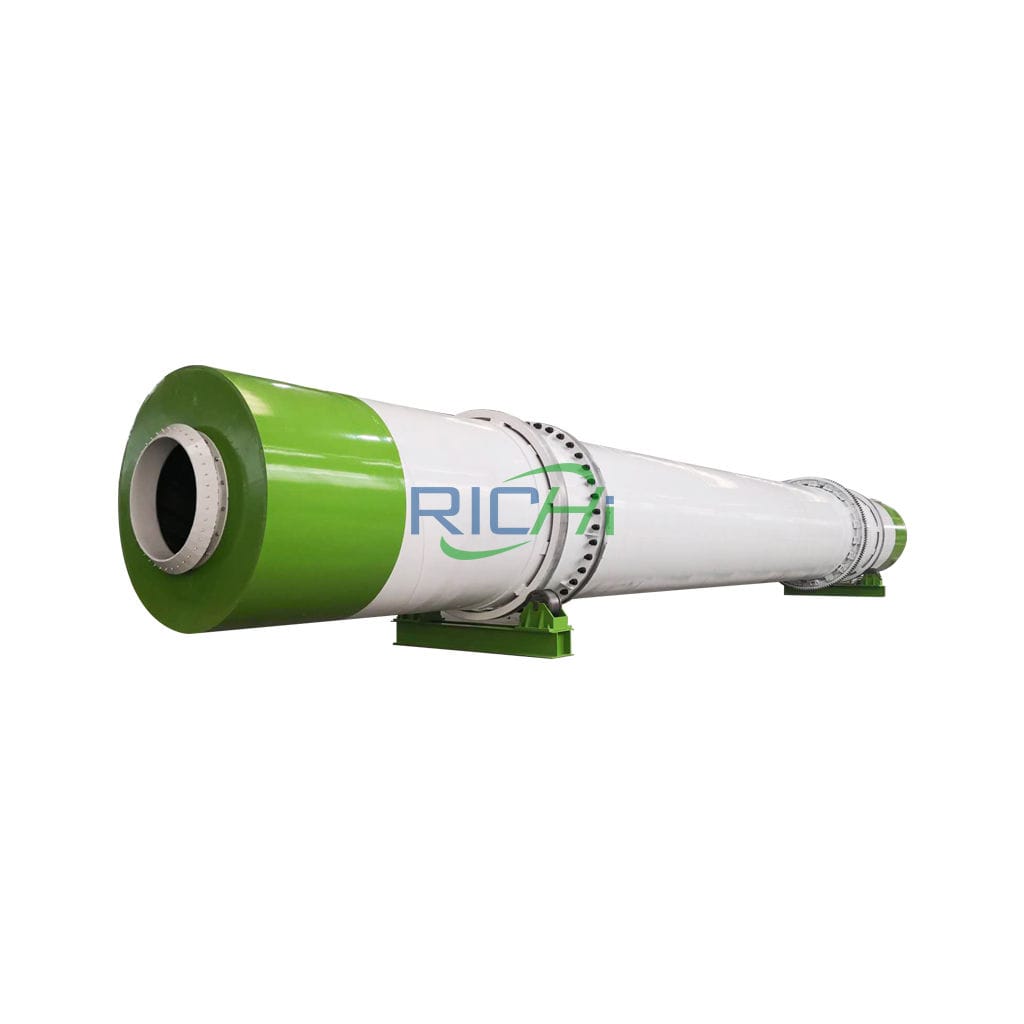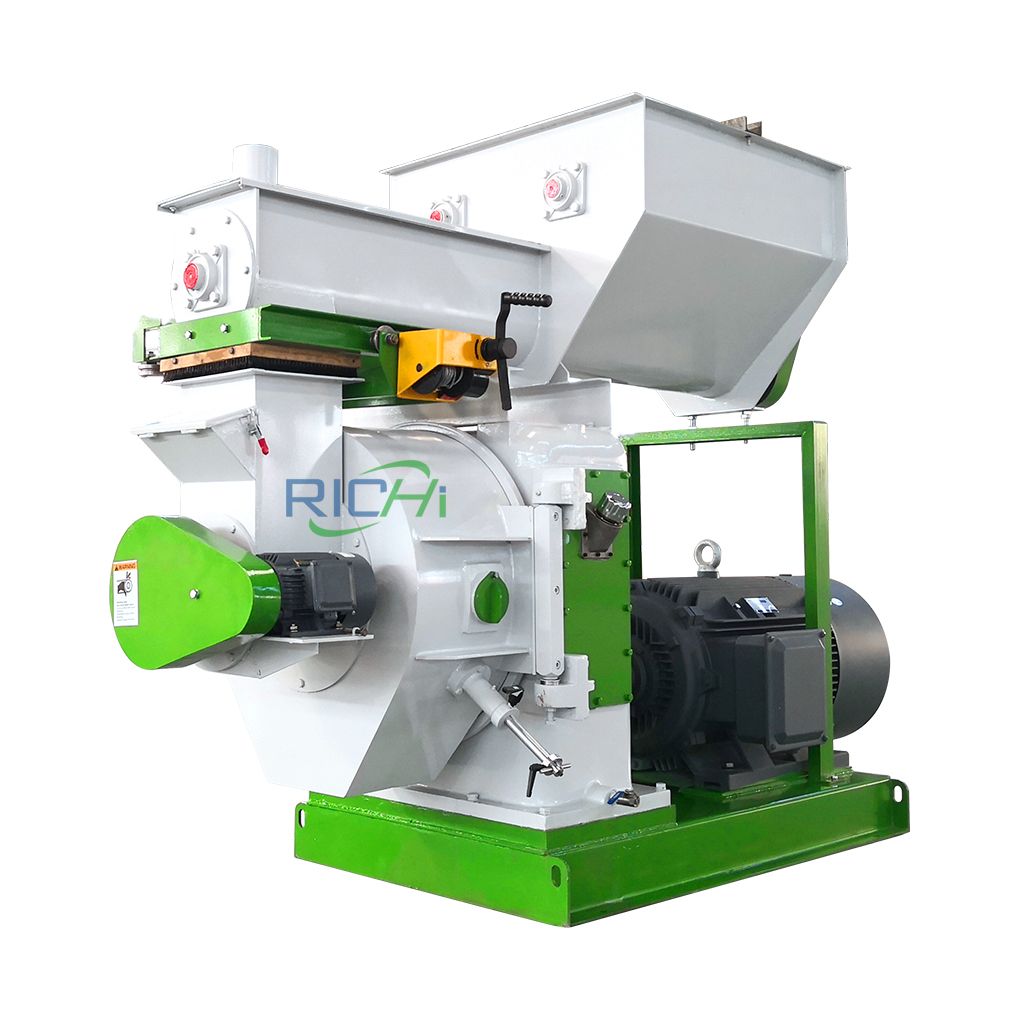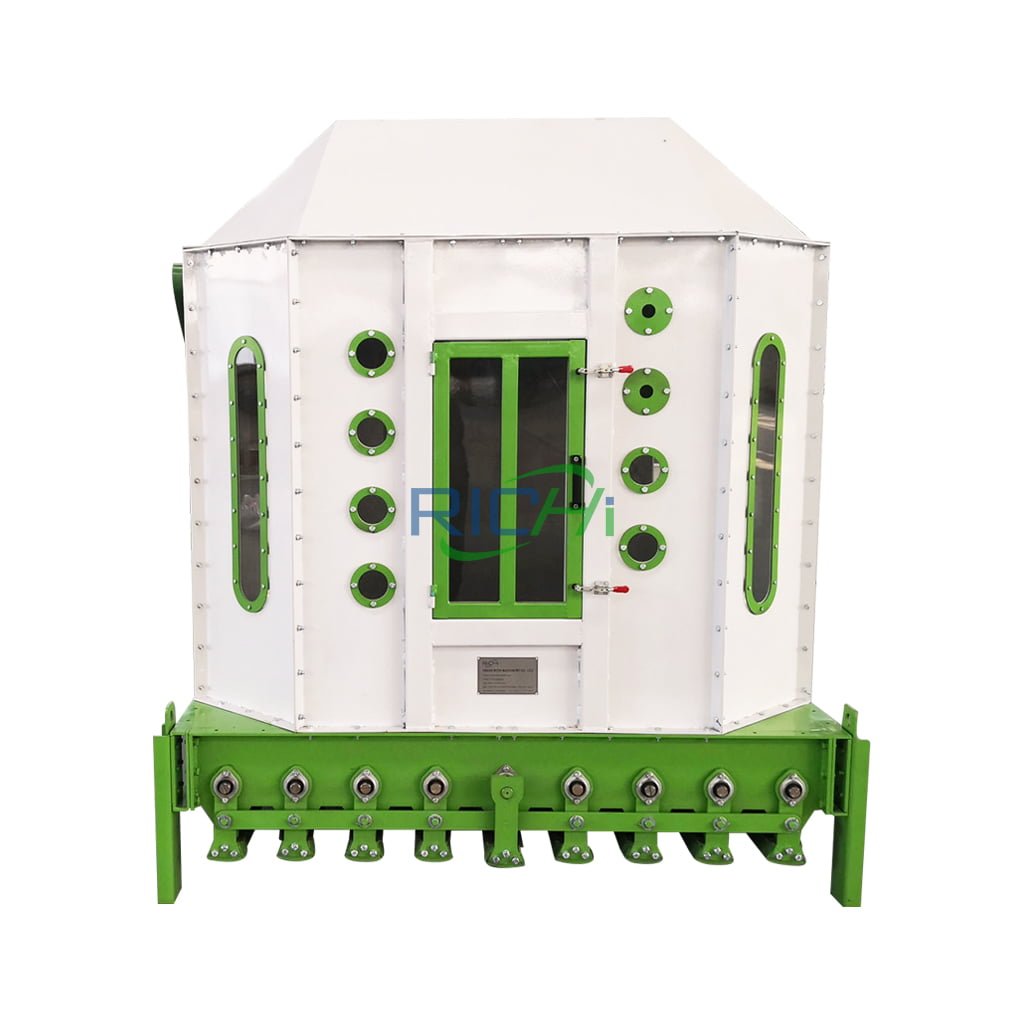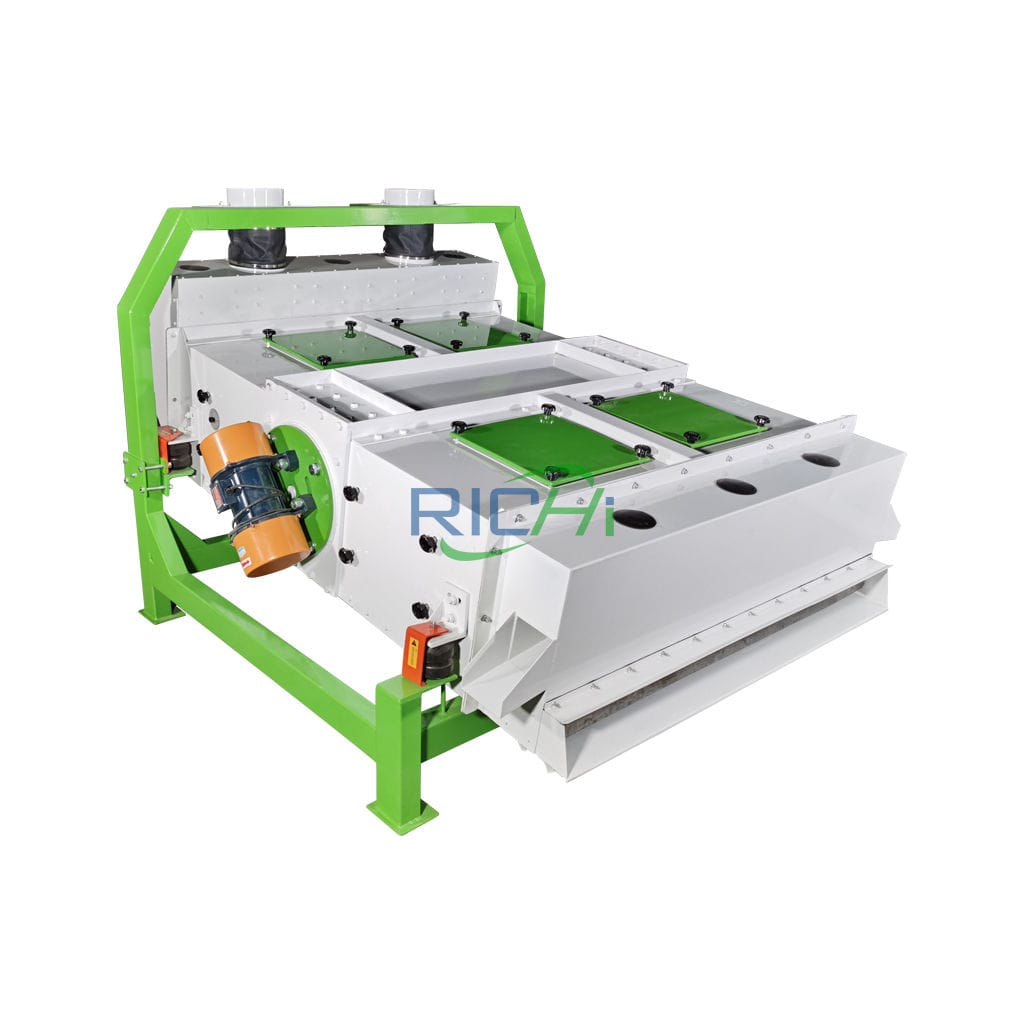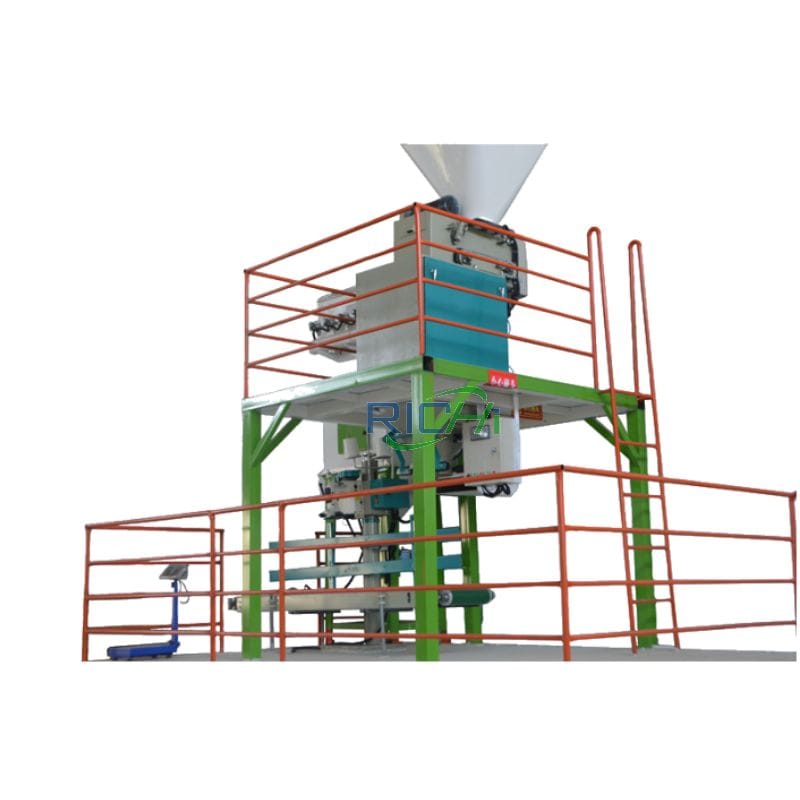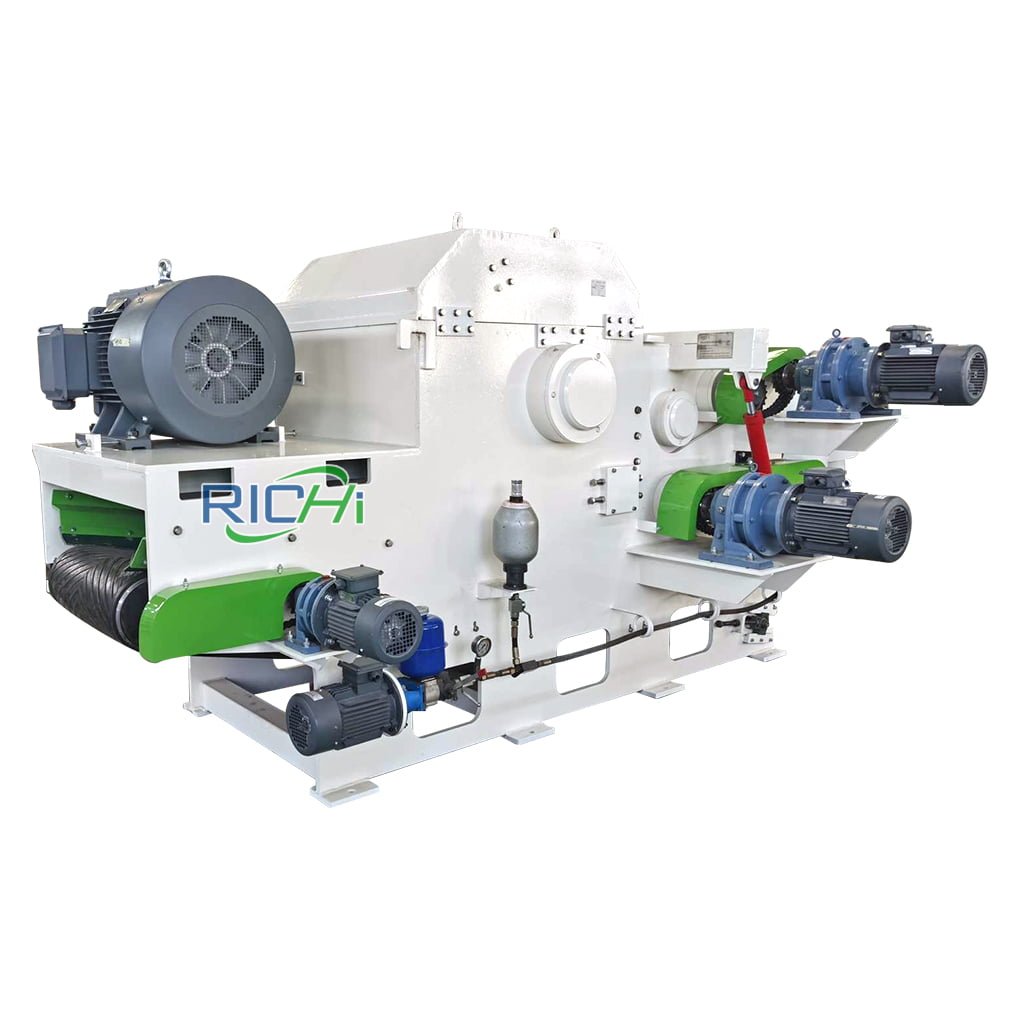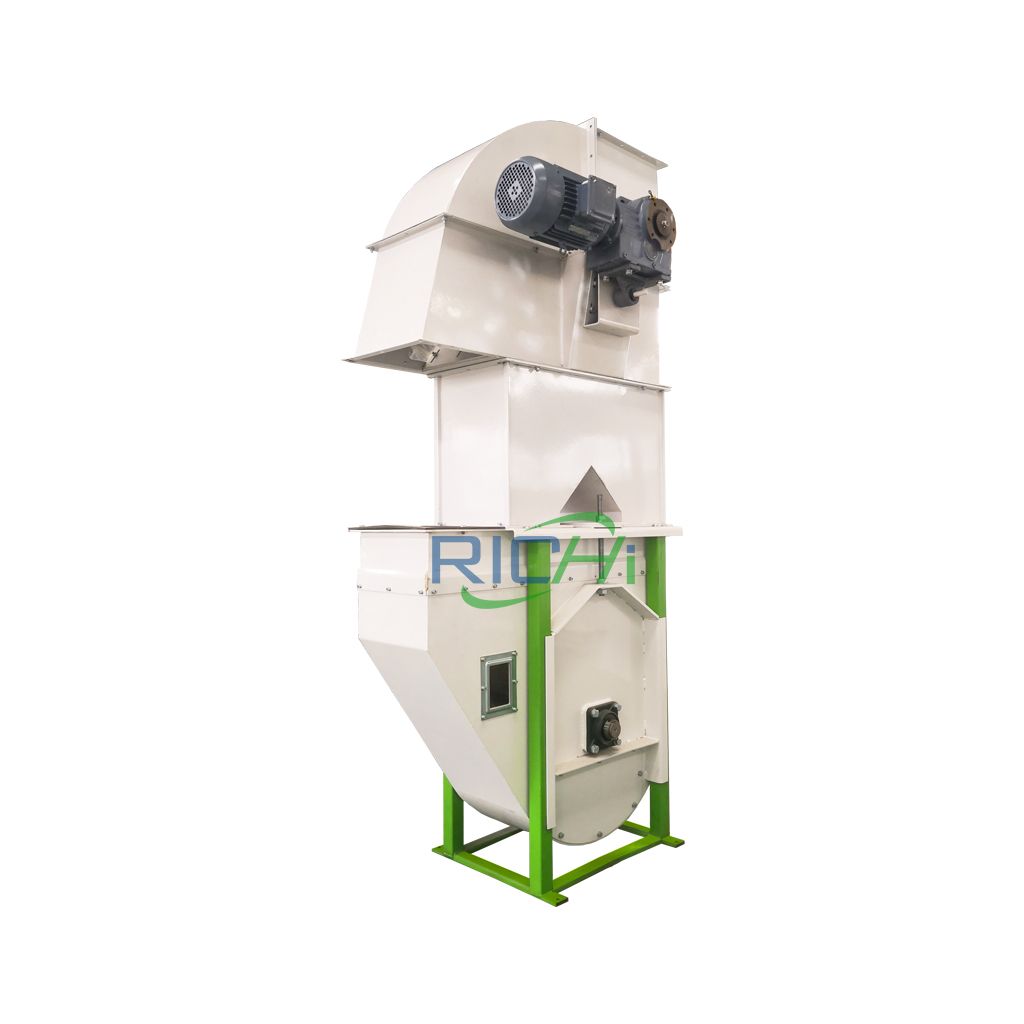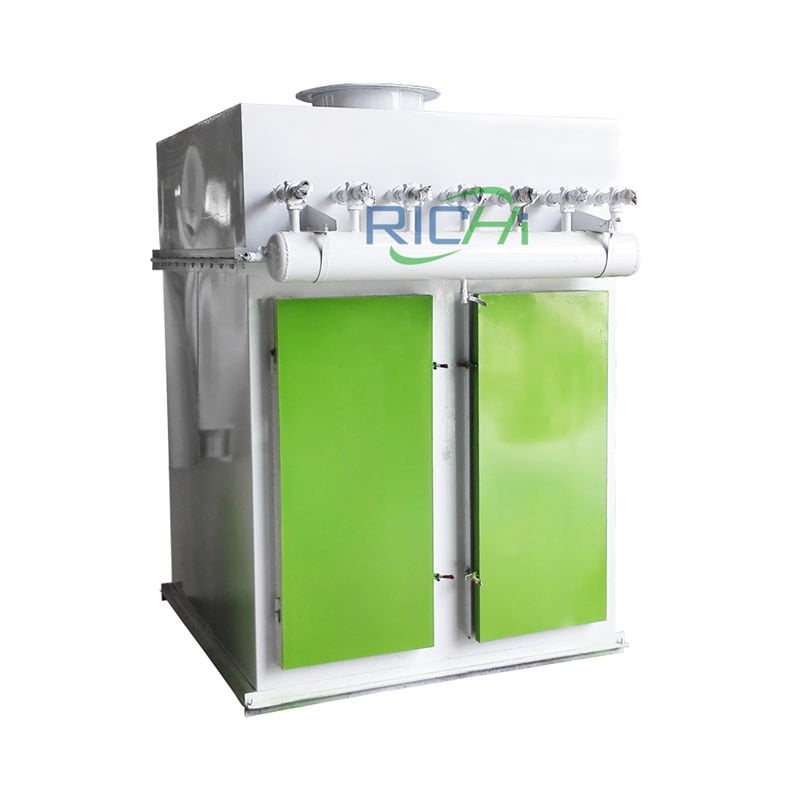
Biomass Pellet Project Cost
Biomass pellet project cost is generally between 50,000-3,000,000 USD. This type of project is usually used to process biomass fuel, biomass feed, animal bedding and other pellets products.

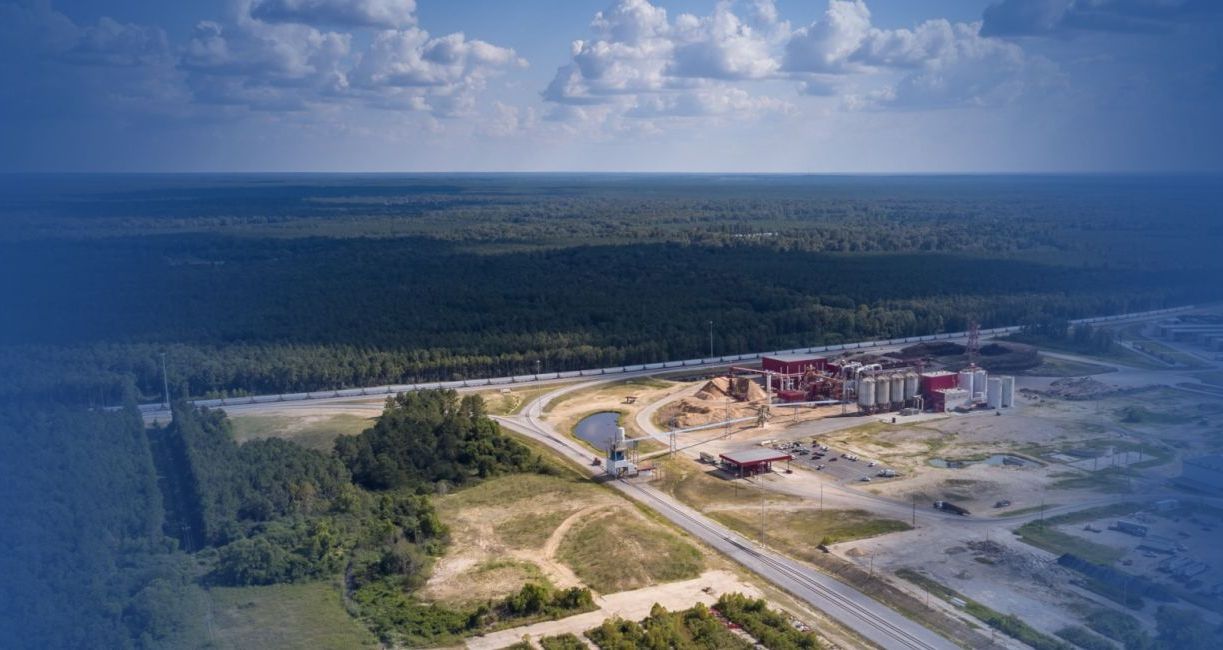
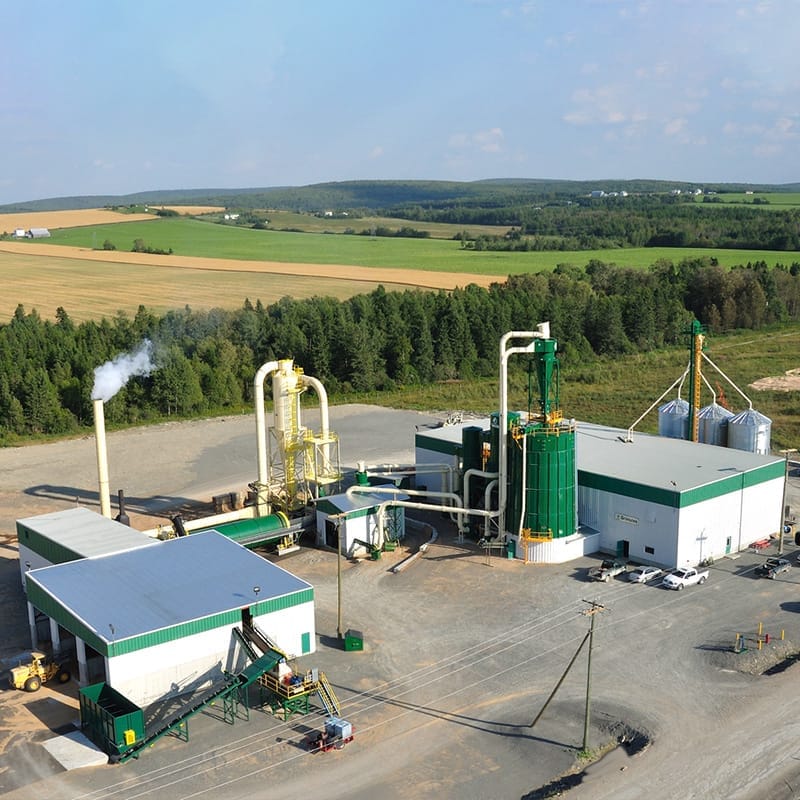
RICHI provides proven, effective biomass pellet project solutions for biomass handling and processing. The scope of supply can vary from complete biomass pellet plants to individual equipment delivery.
RICHI is very experienced in biomass pellet project management, ensuring deliveries that are on-time and on-budget, and produce excellent economic results for energy producers.
As an advanced pellet equipment manufacturer, we have installed tens of thousands of biomass pellet production lines at home and abroad.
Currently, some key projects are mainly distributed in the United States, Canada, Indonesia, India, Argentina, Poland, Brazil, Germany, Australia, and New Zealand , South Africa, Saudi Arabia, Thailand, Malaysia, Vietnam and other countries.
- Capacity: 0.3-90T/H
- Applicable raw materials: all types of agricultural and forestry waste, urban waste, etc.
- Applicable customers: forestry groups, energy companies, wood industries, and industrial as well as financial investors in biofuel pellet plants.
- Available services: Contract signing—technical design—civil construction—manufacturing—logistics and transportation—engineering installation—debugging—training—turnkey project—lifetime service
Types of biomass pellet project
RICHI’s biomass handling concept incorporates all process stages, from infeed to storage, and process solutions for any climate and biomass species. Currently, the types of biomass pellet production projects that RICHI can provide cover the following:
- Alfalfa pellet production line
- EFB pellet plant
- rice husk pellet plant
- paper pellet plant
- grass pellet project
- hay pellet project
- hops pellet project
- bagasse pellet project
- bamboo pellet project
- peanut shell pellet project
- corn stalk pellet project
- rice straw pellet project
- wheat straw pellet project
- leaf pellet project
- cassava pellet project
- hemp pellet project
- coffee pellet project
- coco peat pellet project
- coal pellet project
- miscanthus pellet project
- cotton stalk pellet project
- sunflower shell pellet project
- coconut shell pellet project
- …
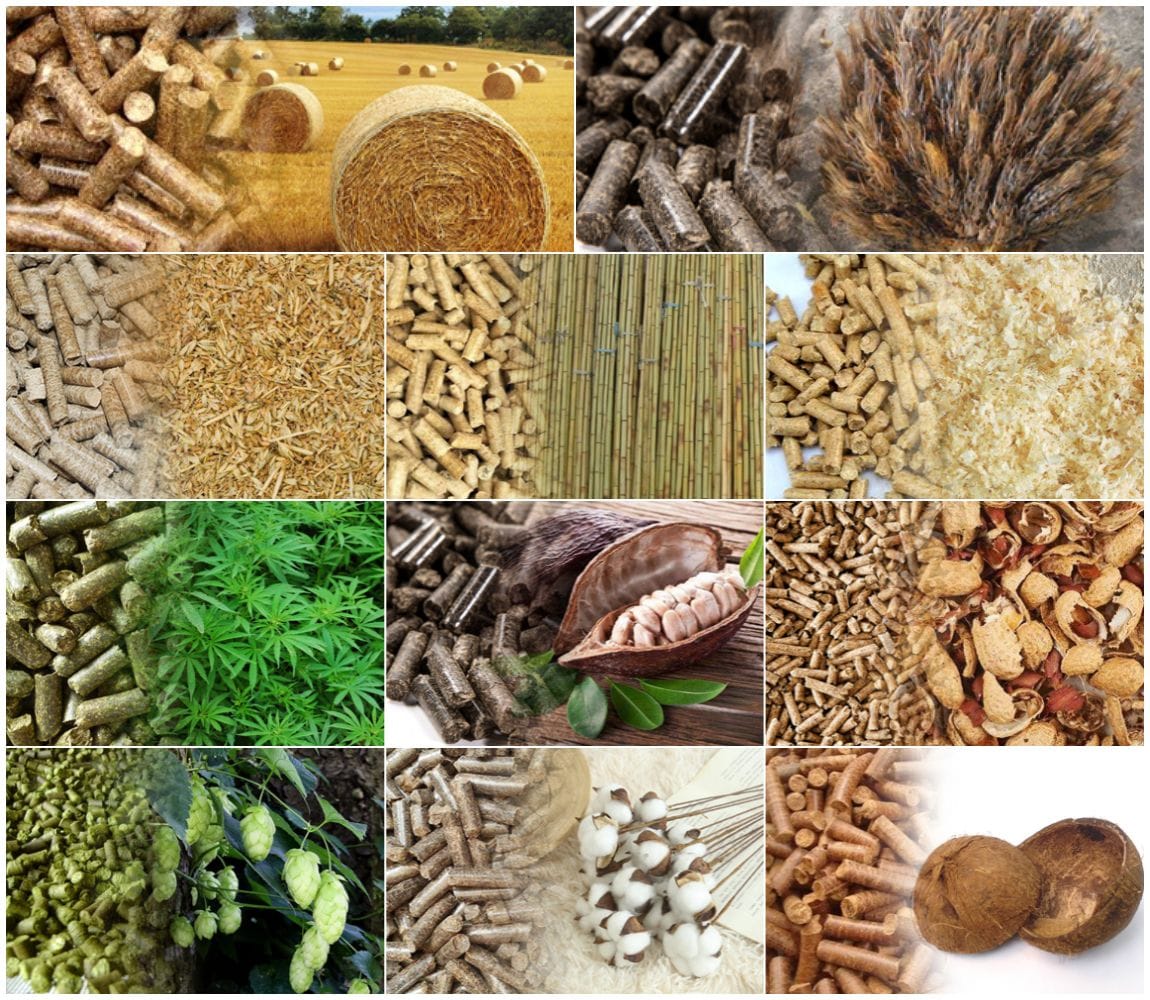
composition of biomass pellet project cost
Biomass pellet project cost is the total cost that an enterprise needs to invest when establishing new production facilities or expanding existing production capabilities. These biomass pellet project costs usually include the following areas:
- 1. Land cost: This includes the cost of purchasing or leasing land, as well as the cost of land development, consolidation and infrastructure construction.
- 2. Construction costs: including the cost of building factories, warehouses, office buildings, dormitories and other production and living facilities.
- 3. Equipment acquisition cost: the cost of purchasing production equipment, machines, tools, etc.
- 4. Installation and debugging costs: including equipment installation, debugging and trial production costs.
- 5. Raw material cost: the cost of various raw materials used in the biomass pellet production process.
- 6. Labor costs: wages, benefits and training fees paid to employees.
- 7. Energy and water costs: Production requires a certain amount of energy and water, including electricity, gas, water, etc.
- 8. Other indirect expenses: including administrative expenses, sales expenses, financial expenses, etc.
The above are the main components of the biomass pellet plant project cost. Biomass pellet enterprises need to conduct specific analysis and budget according to the actual situation to ensure the effectiveness of the investment and maximize the benefits.
We have the experience and know-how to cover your biomass pellet manufacturing needs. Our focus is to bring your performance forward. Our expertise in sustainable energy production is at your disposal.
Different biomass pellet making projects, different biomass pellet project cost
Each biomass pellet project is unique and accordingly, the price of each biomass pellet project is also different. The difference in project costs mainly stems from different customers’ raw materials, process requirements, and equipment configurations…
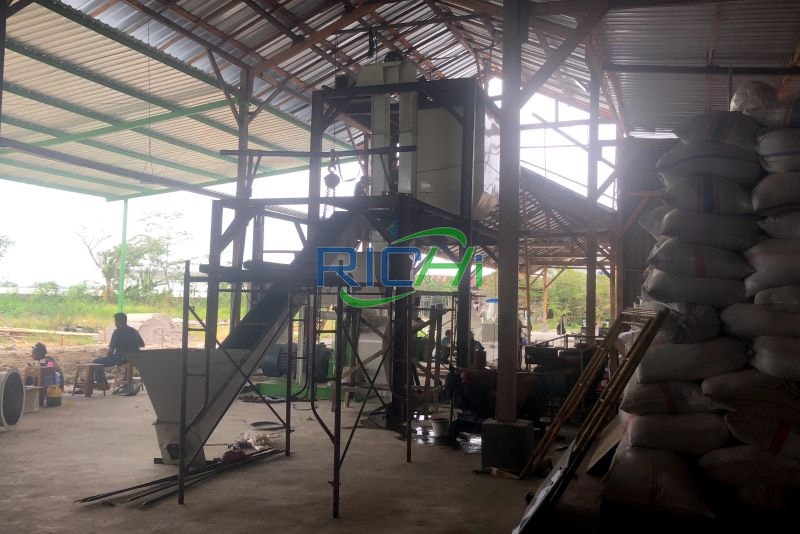
1 T/H biomass pellet project In Vietnam
- Country: Vietnam
- Production: 2500 t/a
- Ingredients: wet corn Straw waste
- biomass pellet project cost: 180,000 USD
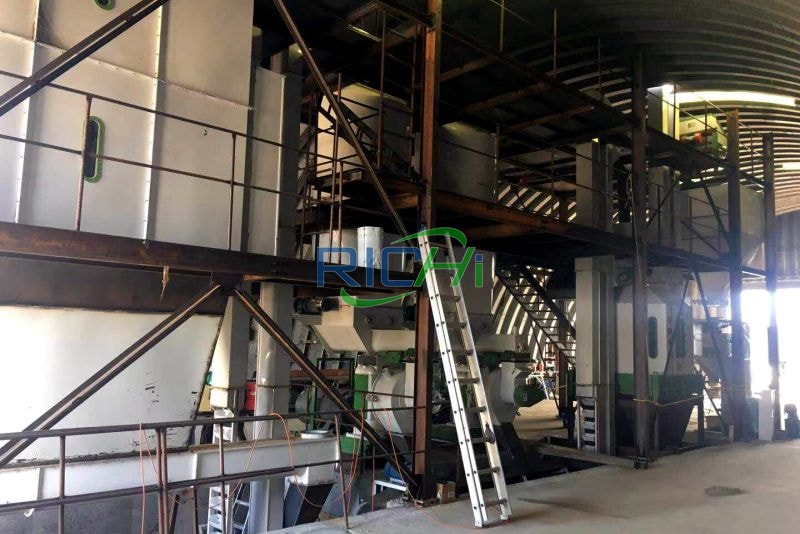
4 T/H biomass pellet project In India
- Country: India
- Production: 10,000 T/A
- Ingredients: bamboo, rice husk
- biomass pellet project cost: US$270,000
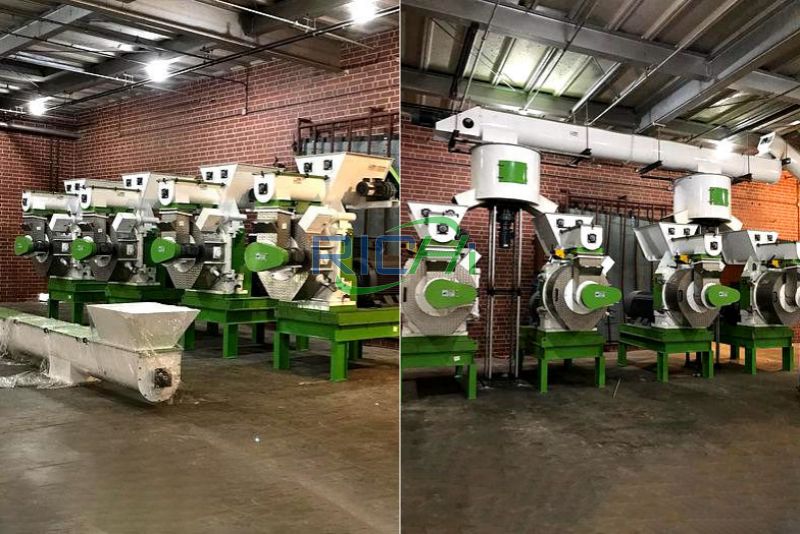
20 T/H biomass pellet project In United States
- Country: United States
- Production: 50,000 T/A
- Ingredients: Miscanthus, Hay, flax straw
- biomass pellet project cost: US$550,000
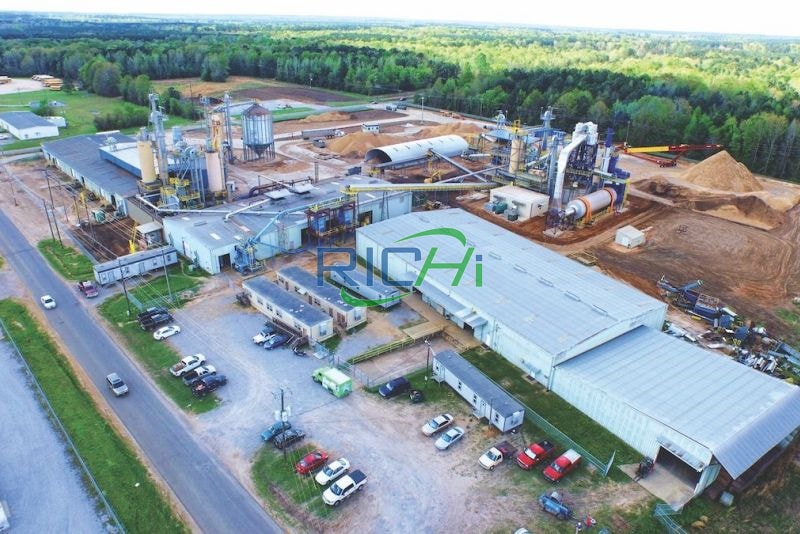
15 T/H biomass pellet project In Malaysia
- Country: Malaysia
- Production: 35,000 T/A
- Ingredients: palm waste, straw, husk, wood waste
- biomass pellet project cost: 410,000USD
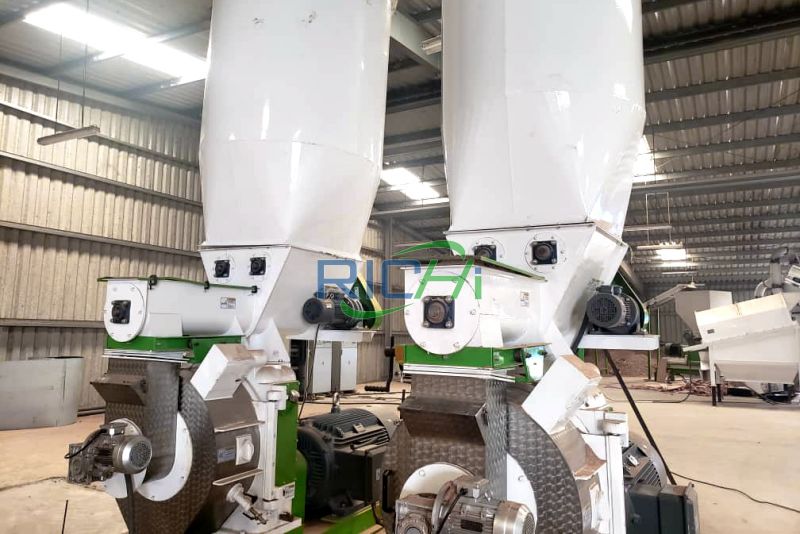
4 T/H biomass pellet project In indonesia
- Country: indonesia
- Production: 10,000 T/A
- Ingredients: palm waste, Sawdust
- biomass pellet project cost: 190,000 USD
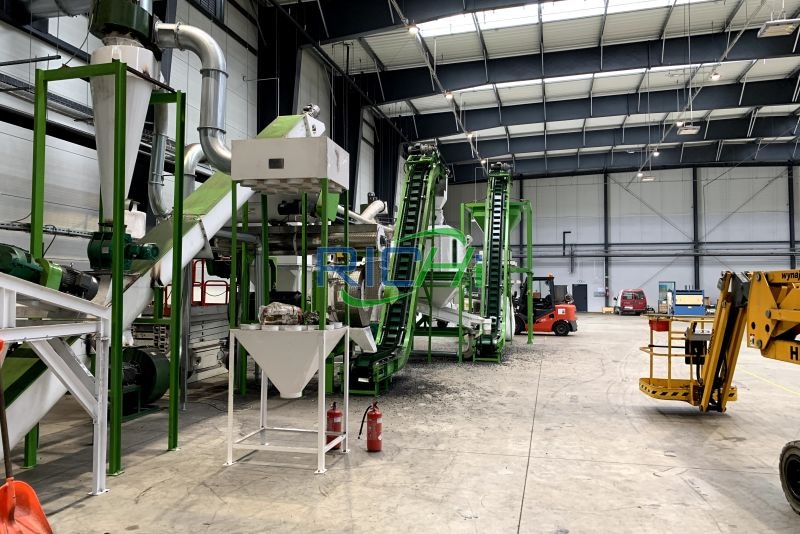
20-25 T/H biomass pellet project In Thailand
- Country: Thailand
- Production: 55,000 T/A
- Ingredients: Peanut shells, straw, rice husks
- biomass pellet project cost: 770,000 USD
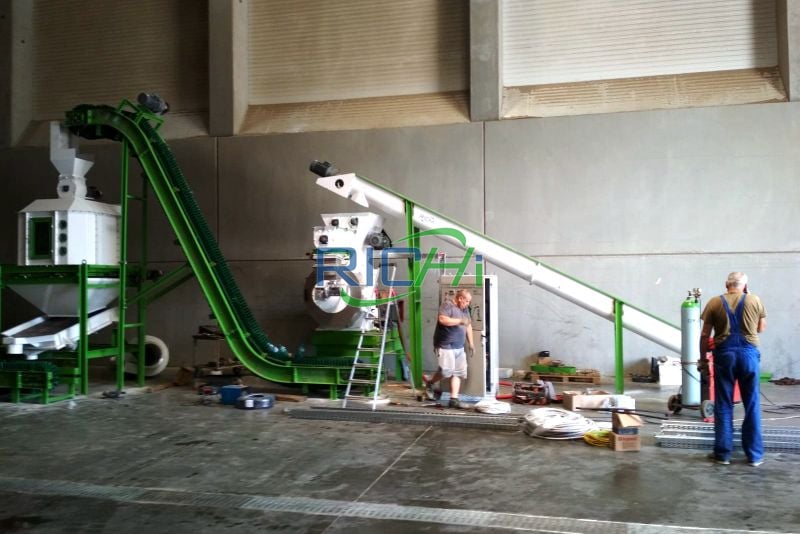
2-3 T/H biomass pellet project In canada
- Country: South Africa
- Production: 6,000 T/A
- Ingredients: Straw, hay, Sawdust, blocks, planks
- biomass pellet project cost: $160,000
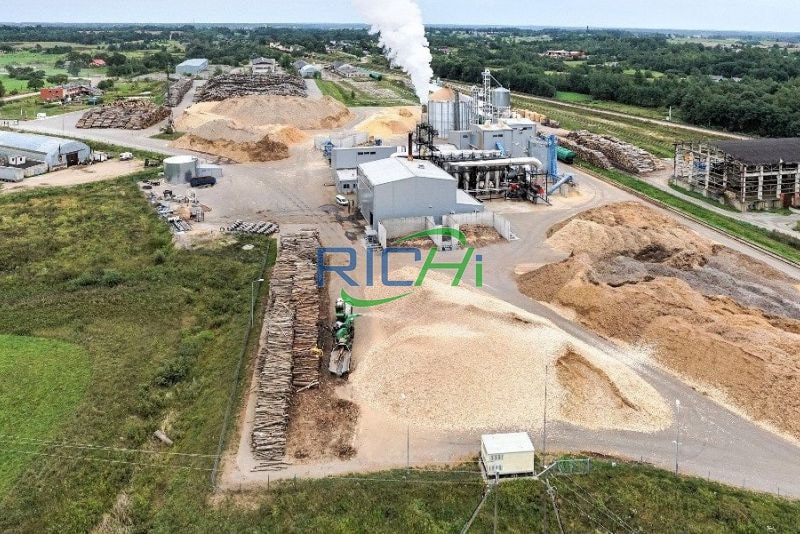
10-12 T/H biomass pellet project In Pakistan
- Country: Pakistan
- Production: 30,000 T/A
- Ingredients: cotton stalk, sawdust
- biomass pellet project cost: $785,000 USD
Behind every biomass pellet project, there is a story. As an industry leader in quality infrastructure choices, Richi Machinery is offering its customers solutions and services that allow them to achieve groundbreaking results.
Different equipment configurations, different biomass pellet project costs
With over decades of experience in the industry, we have gained a perspective that has allowed us to match our customers’ needs with the most optimal approach while laying a solid foundation for years of sustainable growth.
The followings are some featured biomass pellet production line project report, and RICHI will show you “different equipment configurations, different biomass pellet project costs”.
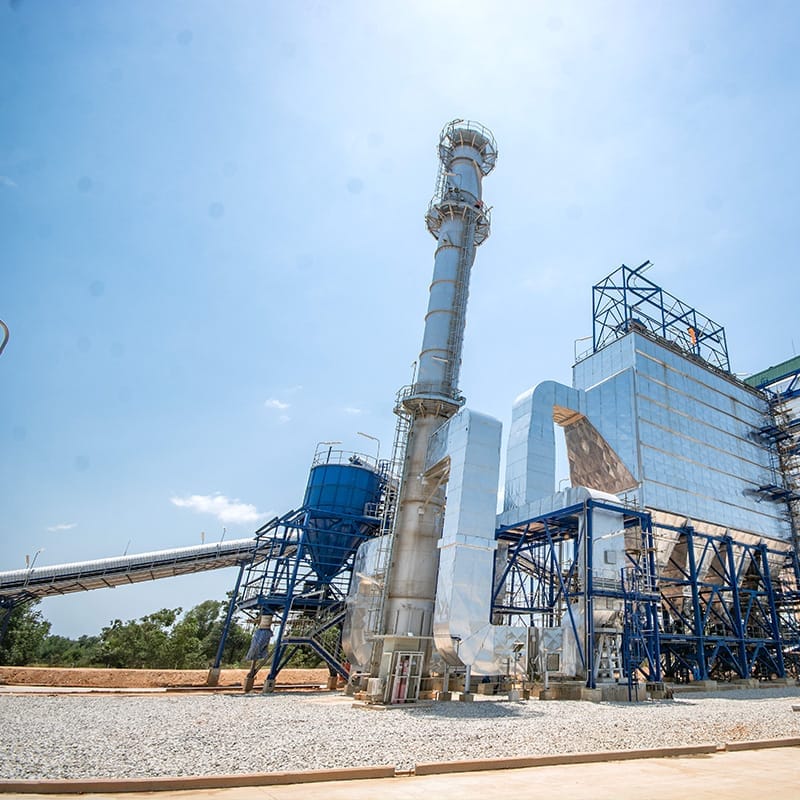
8 T/H biomass pellet project in argentina
—— RICHI MACHINERY ——
- Annual output: 20000 t/a
- Biomass pellet project cost: 430,000 T/H
- Construction content: 2 new production workshops will be built. Among them, Workshop 1 is 4,000 square meters, including office and living rooms, production workshops, raw material warehouses, and finished product warehouses. Workshop 2 is 4,000 square meters, including production workshops, raw material warehouses, and finished product warehouses.
- Annual water consumption: 870 t/a
- Annual power consumption: 100,000 kwh
- Main raw materials: straw*20000t/a, mainly flax straw
- Main equipment: forklifts, crushing and bundling machines, crushers, biomass granulators, coolers, packaging scales, screening machines, transformers, etc.
8T/H canada Biomass pellet project Process flow introduction:
- The straw in this project is purchased from farmers’ farmland. The farmers dry the straw in the field. After drying, they use a forklift to put the crop straw into the crushing and bundling machine for simple crushing and bundling to facilitate transportation. Finally, it is transported by a transport vehicle. Return to factory warehouse for later use.
- Raw material loading: The purchased raw materials are placed in the raw material warehouse for later use. The raw materials are transported to the feeding port by forklifts and manually fed.
- Crushing: The purchased straw is sent to the crusher for crushing processing, and the crushed materials directly enter the sealed silo through the conveyor belt.
- Granulation: The raw materials crushed by the crusher are transported to the granulator by a belt and extruded into finished products.
- Cooling: The granulated granules are transported to the hopper using a sealed belt for natural cooling. After cooling, they are measured and packaged for storage.
- Packaging: After natural cooling, the finished product is sent to the ton bag through the conveyor belt for packaging, and the finished product is put into storage for sale.
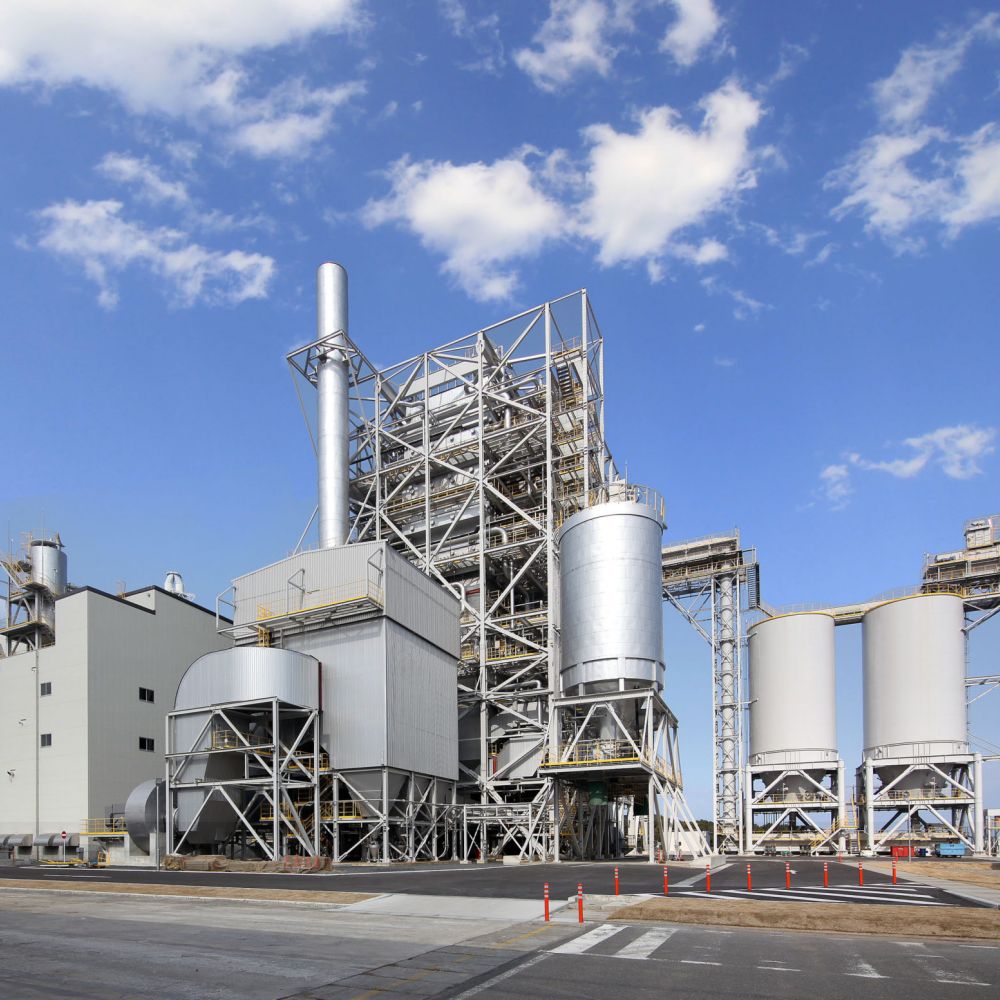
3 T/H Biomass straw pellet project in australia
—— RICHI MACHINERY ——
- Annual output: 6064.97 tons of biomass fuel pellets
- Construction content and scale: covering an area of 10,000 square meters and a total construction area of 4,510 square meters.
- Biomass pellet project cost: :370,000 USD
- Annual power consumption: 1.42 million KWh/a
- Annual water consumption: 288t/a
- Work system: 8 people, 240 days of annual production, 1 production shift, day shift, 8 hours per shift, 1920 hours of annual production, employees are not provided with food and accommodation in the factory;
- Product packaging bags: Packed according to 25 kilograms, 240,000 packaging bags are needed annually.
- Main equipment: crusher, dryer, granulator, belt conveyor, hot blast stove, finished product silo, electronic control system, etc.
3 t/h Biomass pellet project Process Description:
- Crushing:The raw materials with irregular shapes and sizes are put into the crusher and pulverizer successively. After crushing and pulverization, the raw materials become fine particles with uniform fineness of about 3 mm.
- Drying: The straw dryer is heated by burning biomass fuel. The hot flue gas is sent into the dryer through negative pressure and directly contacts the raw materials in the dryer to achieve the drying effect. The drying temperature is 140~200℃, and the moisture content of the raw materials after drying is about 12%.
- Granulation: The crushed and dried raw materials are fed into the straw pellet machine for granulation. After natural cooling, the shaped granules are packed into boxes and stored in the warehouse.
- Screening: The cooled pellet fuel is screened using a vibrating screen to screen out the debris to ensure the factory quality of biomass pellet fuel. The screened out scraps are returned to the previous process for re-granulation.
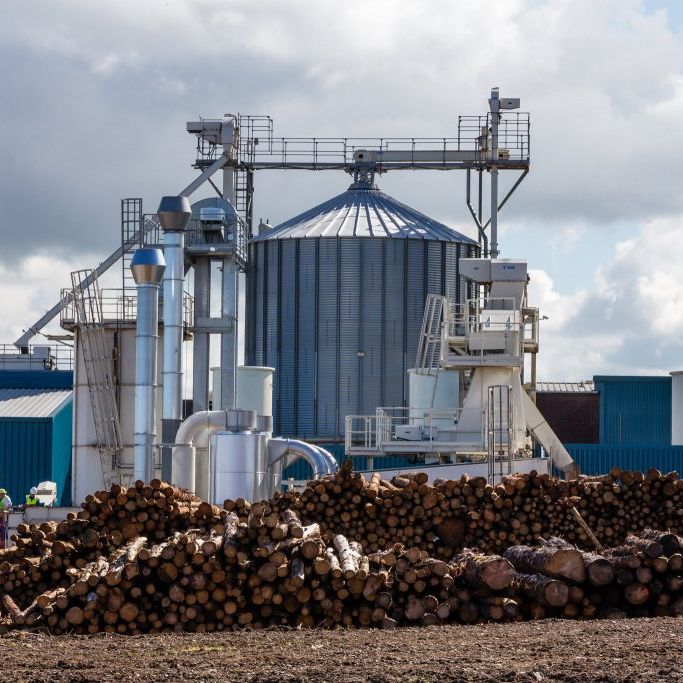
10T/H Biomass EFB wood pellet project in indonesia
—— RICHI MACHINERY ——
- Annual output: 25,000 tons/year
- Biomass pellet project cost: 760,000 USD
- Factory area: 2900 square meters
- Annual electricity consumption: 50,000 kWh
- Construction content: mainly including production workshops and offices
- Labor quota and work system: There are 15 employees in this project, working 300 days a year, one eight-hour shift every day
- Main raw materials: palm waste *10,000 tons/year, waste wood*15,000 tons/year
- Main equipment: slicer (for wood slicing), iron remover, crusher, drum dryer, hot air stove, ring die pellet machine, product silo, packaging machine, etc.
indonesia 10 t/h Biomass pellet project Production Process:
- The biomass pellet manufacturing plant project outsources waste wood and straw. The waste wood enters the slicer for slicing first, then goes into crushing together with the straw for crushing, and then enters the drying barrel through the conveyor belt for hot air drying. The drying furnace uses biomass pellets as fuel. The dried material passes through the closed auger and enters the sealed EFB pellet machine for processing.
- After granulation, the granulated products enter the silo for cooling and packaging.
Floor plan:
The project production workshop will reasonably set up production workshops, raw material warehouses, finished product warehouses, office areas, etc. according to production needs. The layout of the factory area takes into account the process flow, cargo transportation within the factory, fire protection, environmental protection, safety and health requirements.
The bio fuel pellet plant project workshop is divided into zones according to the production process flow, and the same type of production equipment is centrally arranged. The overall process trend is smooth, the functional zones are clear, the layout is reasonable, and it can be equipped with relatively complete infrastructure such as power supply, water supply, drainage, and communications.
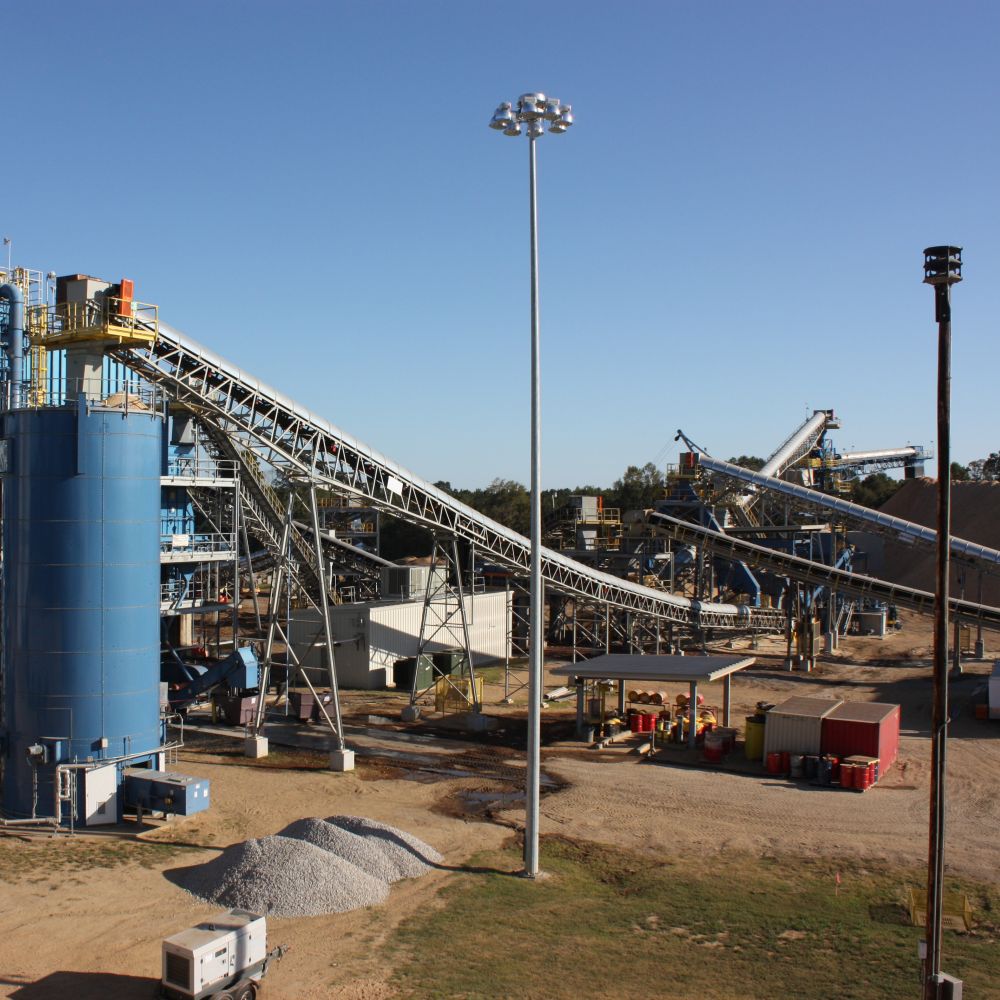
4 T/H Biomass straw pellet production line project in brazil
—— RICHI MACHINERY ——
- Annual output: 10,000 tons
- Biomass pellet project cost: 230,000 USD
- Total building area: 2350 m2
- Main raw materials: wheat straw*6000 tons/a, rice straw*2000 tons/a, corn straw*4000 tons/a
- Straw pellet specifications: diameter 6~8mm; length: 30~50mm. Density: 700~1400 kg/cubic meter; Ash content: 1~20%; Moisture ≤15%
- Power supply: output 380V power for production and 220V power for office and daily life.
- Water supply: 140m3/a
- Work system: 8 people, single shift, 8 hours of work per day, 350 working days per year.
- Main equipment: straw crusher, straw extrusion molding machine, centralized feeding system, baler, cooler, packaging scale, etc.
4 t/h india Biomass pellet project Process Description:
- Raw materials: The purchased and bundled straw is transported to the factory area and temporarily stored in the raw material warehouse in the project area. The purchased bales of straw are delivered to the workshop warehouse through loaders, forklifts, etc., and are manually loaded and unloaded onto the conveyor. The straw conveyor adopts a closed structure. Some raw materials with higher moisture content will be dried in the drying field before use. The straw is sent to the crusher via a forklift for crushing.
- Crushing: Wheat straw, rice straw, and corn straw are crushed using a crusher. Only after crushing can they be granulated. The raw materials after crushing are less than 5 mm.
- Granulation and molding: The crushed materials are sent to the biomass pellet machine through the bucket elevator.
- Cooling: During granulation and discharging, the temperature of biomass pellet fuel is as high as 80-90°C. It is sent to the cooling machine through the belt conveyor for cooling. The cooling is completed in 2-3 minutes.
- Packaging and warehousing: This design uses a packaging conveyor for measurement, tape packaging, and delivery to the finished product warehouse.
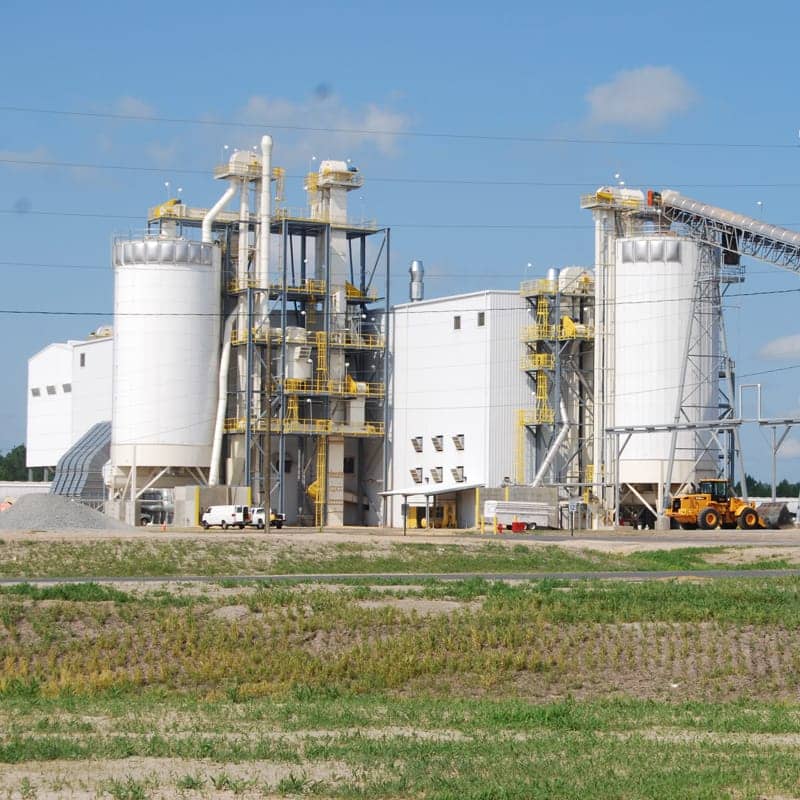
12-15 T/H Biomass agricultural waste pellet plant project in Ghana
—— RICHI MACHINERY ——
- Annual output: 100,000 tons
- Biomass pellet project cost: 830,000 USD
- Construction content: The construction content mainly includes new factories, with a total area of 19181m2. The main buildings are 4 factories, exhibition halls, raw and auxiliary material warehouses and comprehensive buildings, with supporting construction of fire protection, water supply and drainage, power supply, and water treatment. and other auxiliary facilities.
- Annual electricity consumption: 1.81 million KW
- Annual water consumption: 2270.4 m3/a
- Working system: 3 shifts per day, 8 hours per shift, 24 hours a day, 330 days of operation per year.
- Main raw materials: peanut shells 5t/a, rice husk 2t/a, bamboo 1t/a, bagasse 2t/a
- Main equipment: crusher, bucket elevator, belt conveyor, closed air dragon, closed air pusher, trommel screen, dryer, biomass pellet machine, packaging machine, dust removal system, etc.
Biomass pellet project process flow:
- Crushing: The biomass pellet line project puts crop straw and biomass particles into the crusher for crushing until the materials are crushed to a particle size range of 3~5 mm.
- Screening: The crushed materials enter the drum screen for screening. Those with qualified particle size enter the next step, and the unqualified ones return to the crusher for further crushing. After screening, the qualified materials are transported to the drum dryer.
- Drying: The moisture content of the screened materials is above 18%, and they are sent to the drum dryer through a closed conveyor belt for drying to remove the moisture in the materials. The heating energy required for the drying process is provided by the local heating company. The drying temperature is about 85~90°C, the drying time is about 10 minutes, and the moisture content of the dried material is about 15%~18%.
- Granulation: The materials in the project silo are transported to the pellet machine. The rotation of the main shaft in the pellet machine drives the rotation of the pressure roller. After the rotation of the pressure roller, the material is forced to be extruded from the ring die hole into blocks or granules, thus Obtain shaped biomass pellet fuel.
- Cooling: The shaped biomass particles obtained by granulation are transported to a closed silo by a closed conveyor belt for natural cooling.
- Packaging: Pack the finished product through a packaging machine.
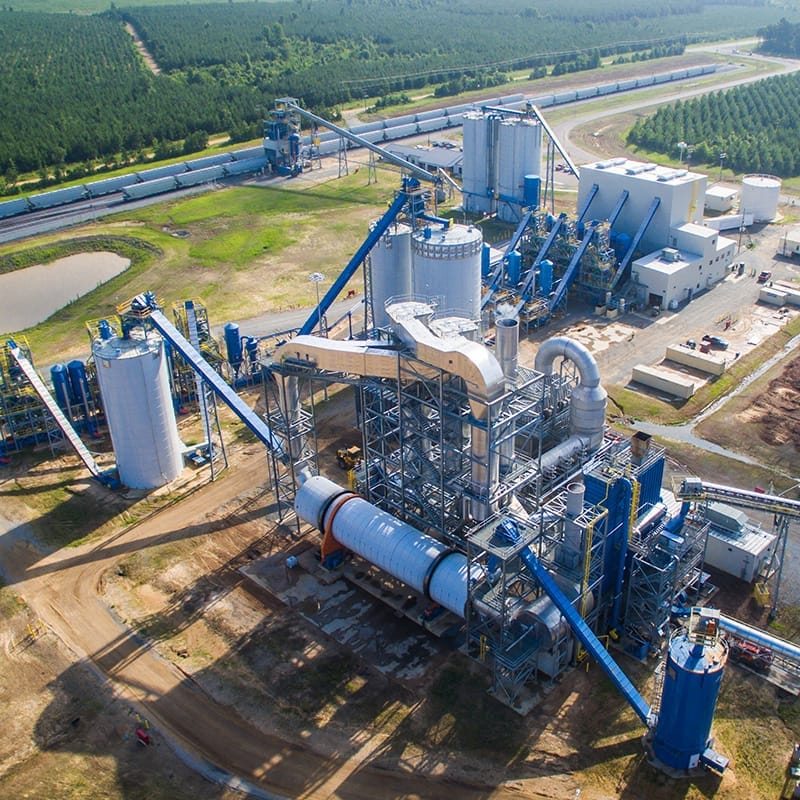
10-12 T/H Biomass pellet project in Russia
—— RICHI MACHINERY ——
- Annual output: 30,000 tons
- Biomass pellet project: 430,000 USD
- Power consumption: 125,000 kW·h/a
- Water consumption: 240t/a
- Work system: 10 employees, 300 working days per year
- Specifications of molded biomass pellet products: The raw materials are mainly rice husks, with a diameter of about 8 mm, a length of 2~3 cm, an ash content of ≦8.0%, a density of ≧1.1 t/m3, and a low calorific value of 3200 kg/kcal. The moisture content of the finished product is less than 2%.
- Main raw materials: sawdust*10,000 tons/a, chaff*20,000 tons/a, reed residue*3,000 tons/a
- Main equipment: crusher, biomass pellet machine, cooler, bucket elevator, automatic bag sewing machine, cyclone dust collector, bag dust collector, belt conveyor, forklift, transformer, floor scale, etc.
Biomass pellet project Process flow:
The process of this biomass pelletizing plant project has strict requirements on the moisture content of raw materials. According to the construction party, the moisture content of the raw materials purchased for this project is lower than 12%, and the moisture content of the finished product is not higher than 2%.
- Crushing: The raw materials pass through the conveyor belt of the belt conveyor and enter the feed port of the crusher for crushing. Crushing is to change large solid raw materials into smaller particles. Since the purchased raw materials contain large pieces, they need to be crushed to avoid affecting the normal operation of the subsequent granulation process.
- Pelletizing: The crushed raw materials are fed from the feed port. Under high temperature and high pressure conditions, the moisture is discharged to the atmosphere in the form of water vapor through the roof exhaust fan. The raw materials are pressed into shaped biomass pellets and transported to the biomass pellet via a belt conveyor to next process. The granulation process uses electric heating.
- Packaging: The formed biomass pellets are transported to the elevator via the conveyor belt, the position is lifted, and then cooled by the cooling machine and packaged into bags.
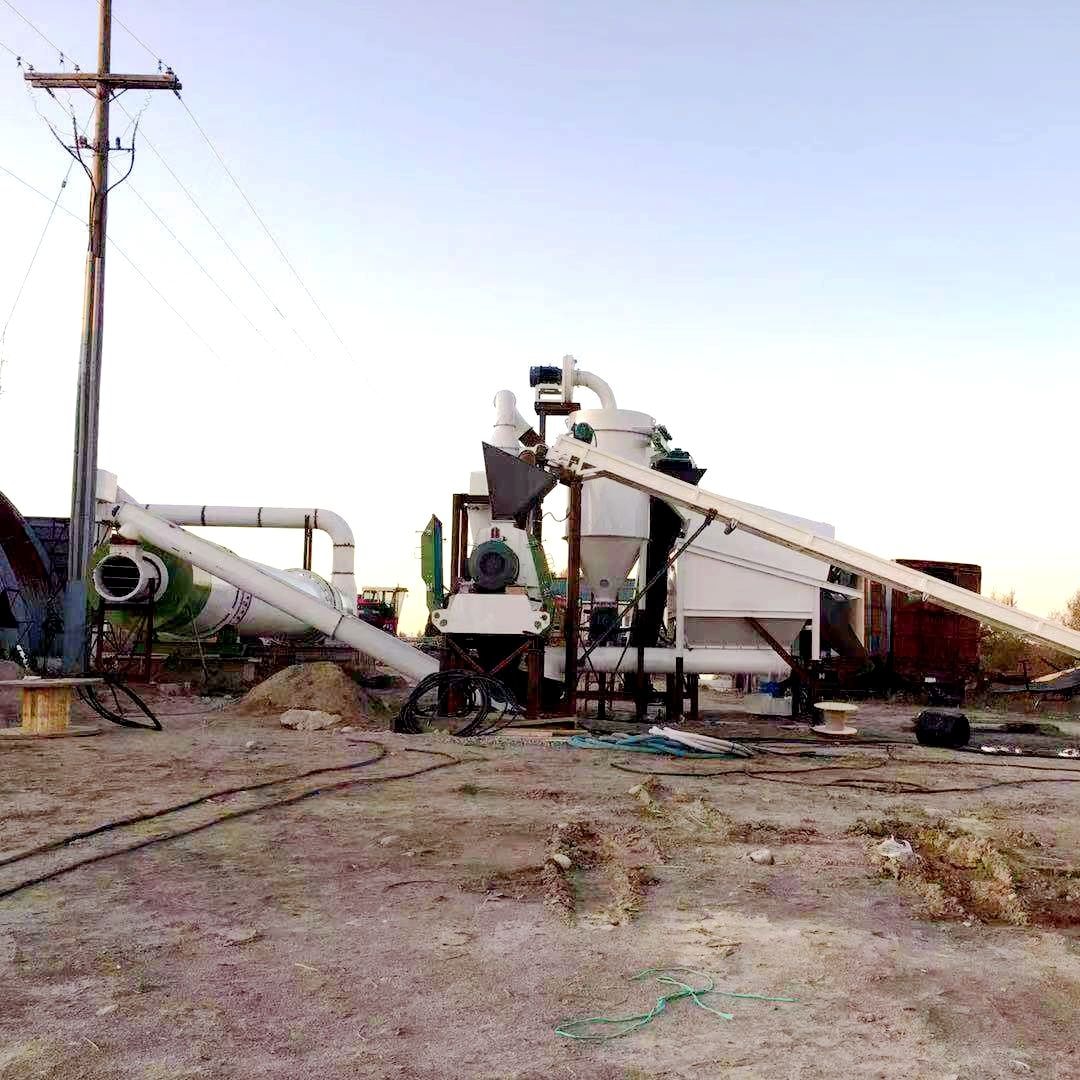
3 T/H Biomass pellet project in south africa
—— RICHI MACHINERY ——
- Annual output: 6000t/a
- Biomass pellet project cost: 350,000 USD
- Covered area: 3000m2
- Particle size: diameter 8mm, length 30-50mm, 25kg/bag
- Work system: 12 people, 240 days per year, 8 hours a day
- Main raw materials: crop straw (corn stalk, sorghum stalk, rapeseed stalk and related agricultural straw)*4900t/a, miscellaneous wood*1300t/a
- Main equipment: slicer, crusher, inlet and outlet conveyor belt, control cabinet, screen, three-pass drum dryer (output 3t/h, material moisture ≤ 45%, final moisture content: 15%;), water film dust removal equipment , U-shaped loading climbing auger, biomass pellet machine, simple skirt conveyor belt, dust removal fan, cyclone dust collector, bag dust collector, etc.
Biomass pellet project Process flow overview:
- The raw materials are filtered and screened by a drum screen (sealed type) and classified into large and usable materials. The large materials enter the crusher for processing;
- Large pieces of material enter the pulverizer (including dust collector) and are crushed by a knife to reach the fineness standard. Enter the dryer to dry to the specified standard;
- Materials with up to standard fineness enter the dryer and evaporate water through hot air until the specified moisture content is less than 20%. The dryer is equipped with a dust collector;
- Materials with moisture content reaching the standard enter the pellet machine through the distribution bin for extrusion molding (the pellet machine is equipped with a dust collector);
- After cooling, the pelletized pellets enter the packaging machine through the conveyor belt for quantitative packaging.
The extrusion granulation process does not require heating or adding water. It is a purely mechanical extrusion process. The temperature of the discharged biomass pellet fuel is as high as 80-90°C. The structure is relatively loose and easy to crush. It must be cooled (the cooling method is natural Cool), cool to normal temperature and then package and store.
As a customer-centric business, we believe that our analysis of a biomass pellet project that identifies a situation, deployed solutions, implementation actions, and identification of those factors that contributed to the success, allows our customers to optimize their infrastructural needs, significantly increasing their awareness of our world-class services.
Different designs, different Biomass pellet project cost
With different output, different raw materials, and different plans, the price of the biomass pellet project will definitely be different. Below are some project plans we have designed for our customers, along with the ex-factory price of the complete set of equipment for the biomas pellet production project.
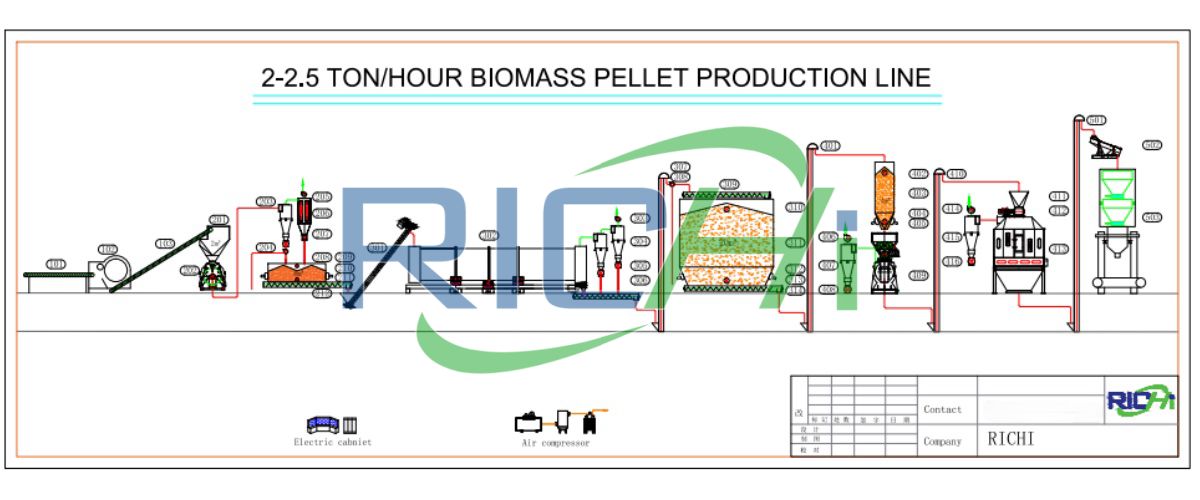
2-2.5 t/h Biomass Pellet Project Design for singapore customer
Cost:260,000 USD
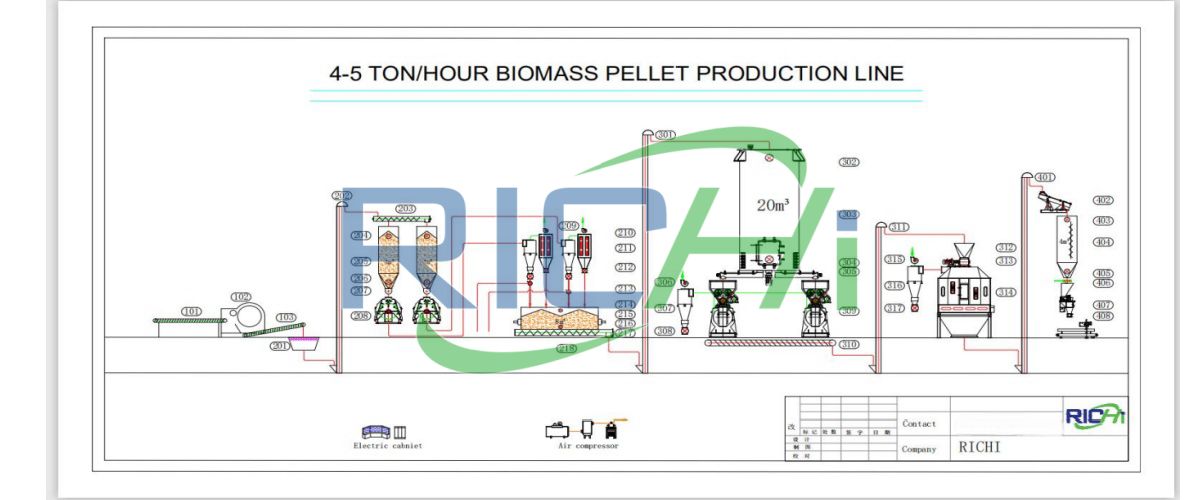
4-5 t/h Biomass Pellet Project Design for mexico customer
Cost:420,000 USD
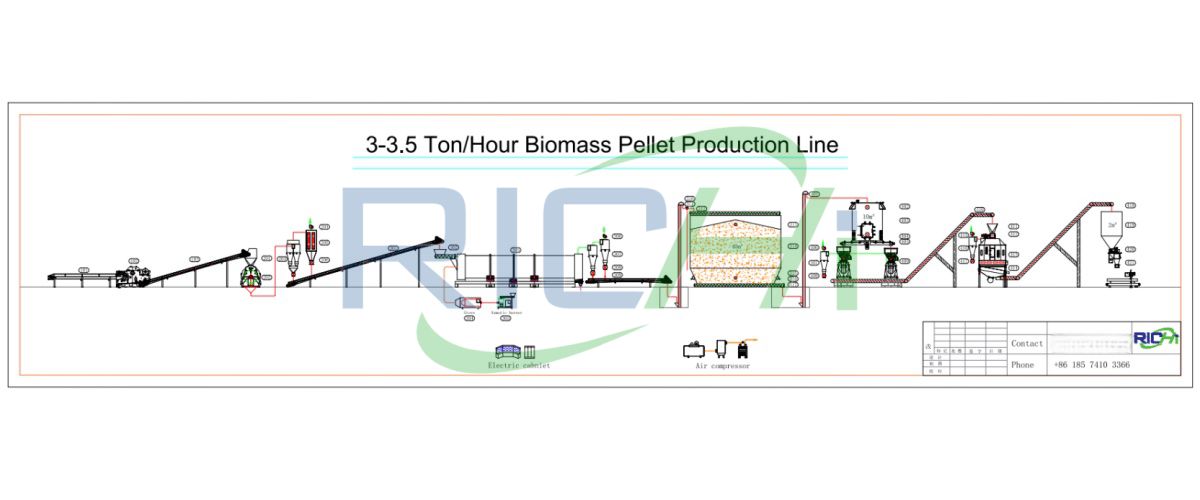
3-3.5 t/h Biomass Pellet Project design for brazil customer
Cost:340,000 USD
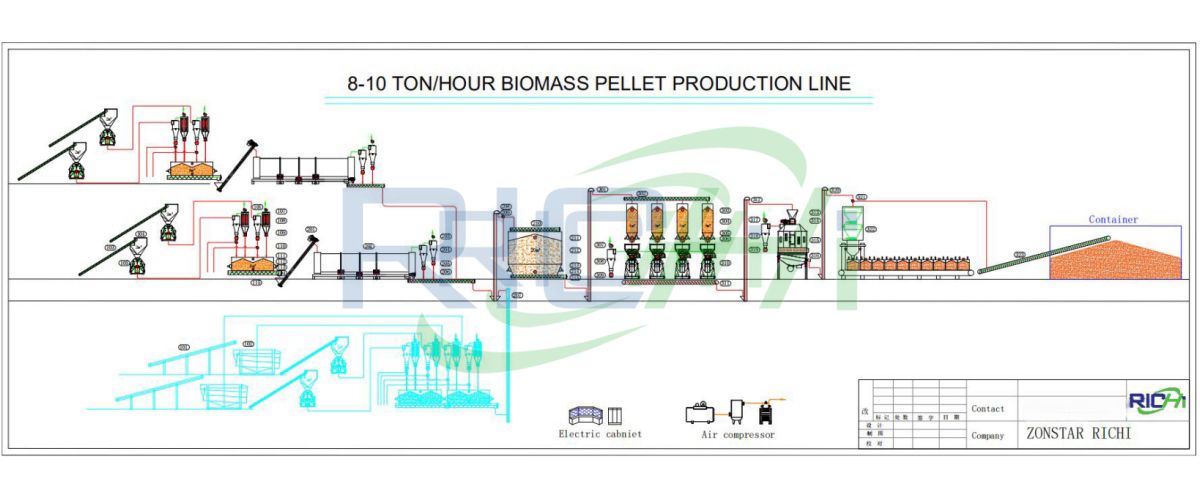
8-10 t/h Biomass Pellet Project Design for U.K. customer
Cost:1,140,000 USD
We realize that each of our clients has a unique brand, target market, capabilities and goals. In these plan studies, you will see how Richi Machinery handled successful infrastructural biomass pellet projects that resulted in short- and long-term success for our customers.
Equipment needed to build biomass pellet project
The equipment configuration of the biomass pellet project is relatively complex, and this “complexity” is mainly for biomass pellet projects processing multiple biomass raw material pellets, because some customers will use multiple raw materials for the same production line, which requires the configuration of multiple Section to “process” these raw materials so that these raw materials can meet the conditions for entering the biomass pelletizer.
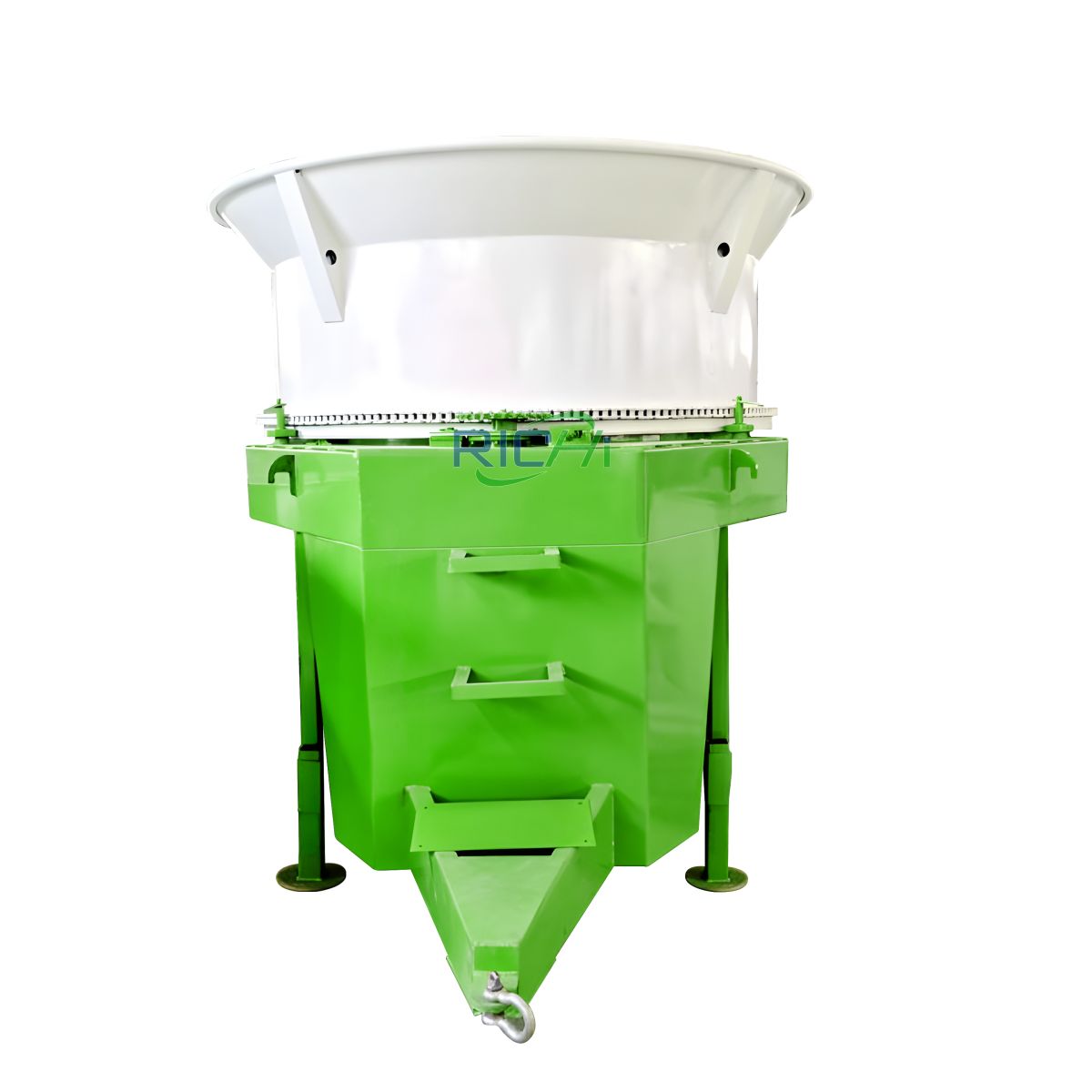
Bale breaker
Capacity:
1-15T/H
Main Power:
30-150KW
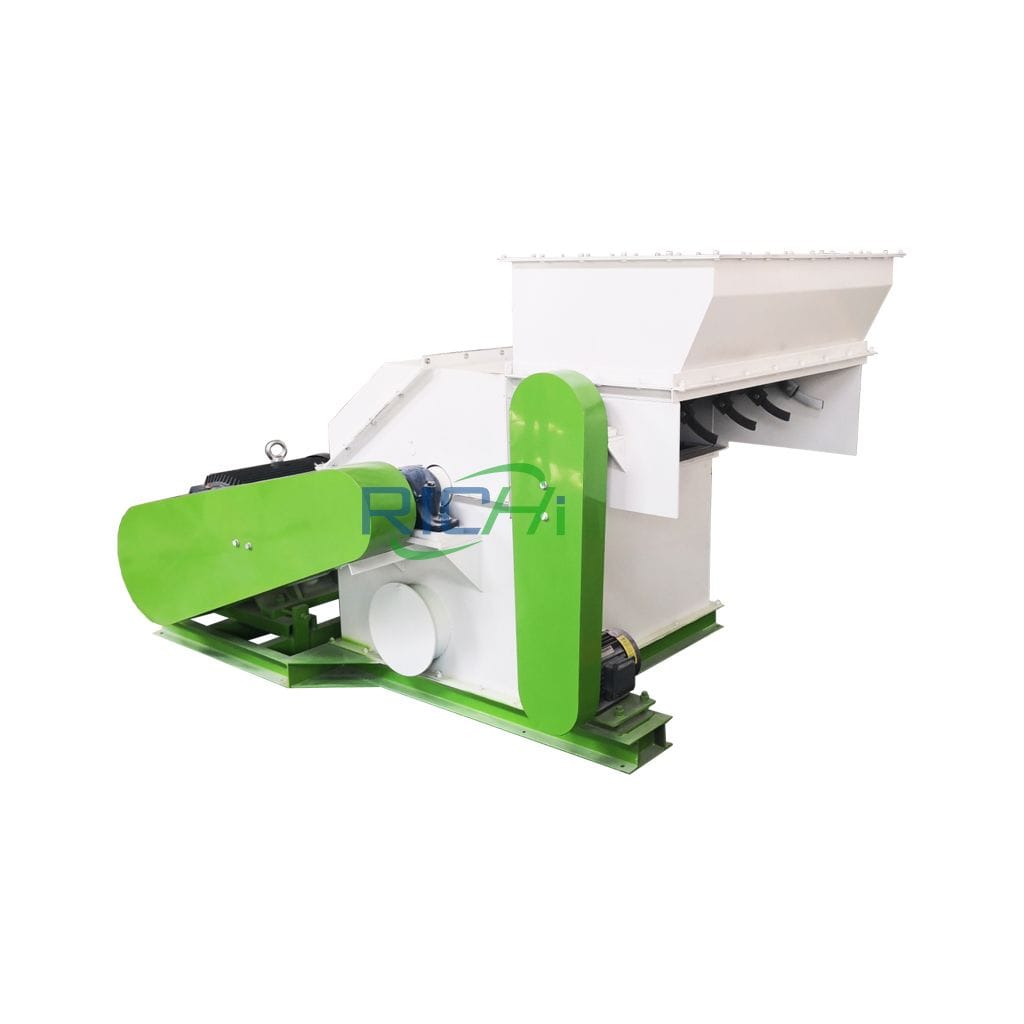
straw grass crusher Machine
Capacity:
0.3-3 T/H
Main Power:
22-93 KW
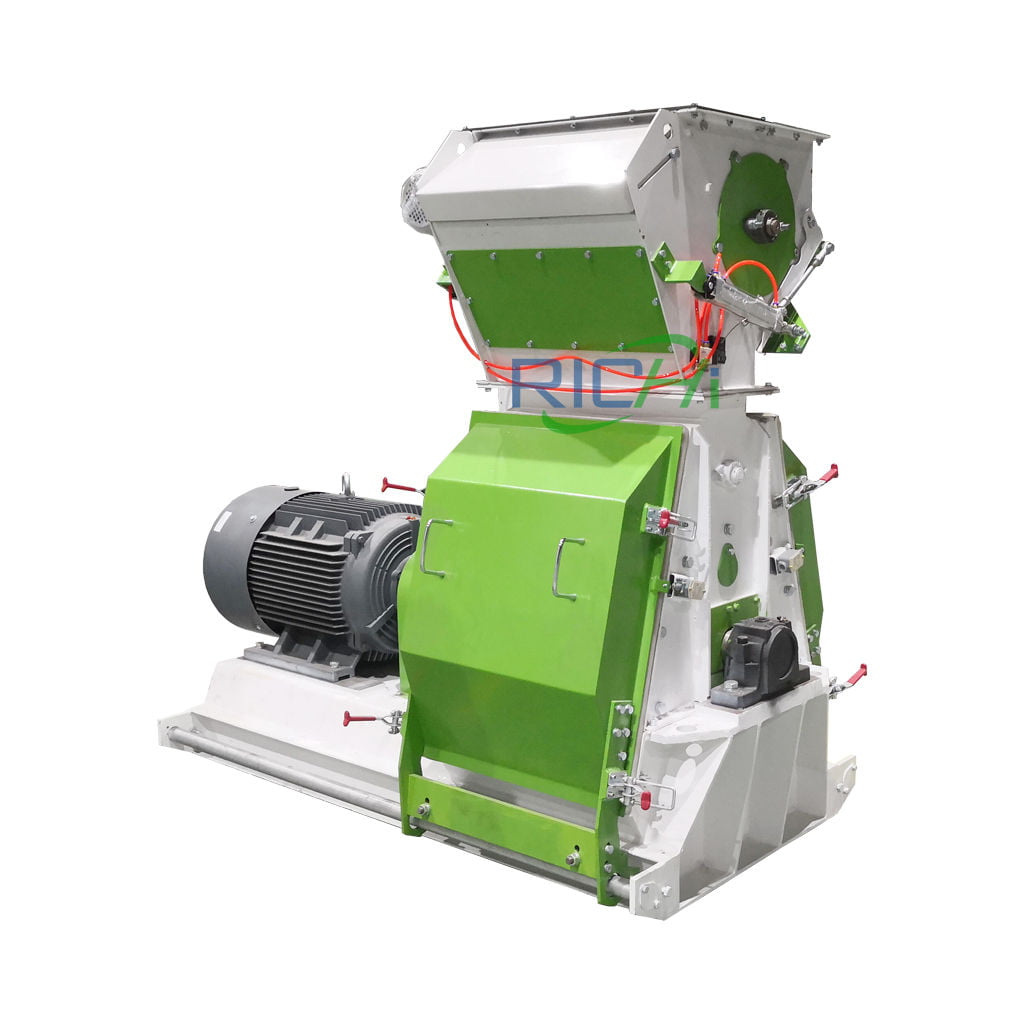
Hammer Mill crusher
Capacity:
3-25T/H
Main Power:
30-160KW
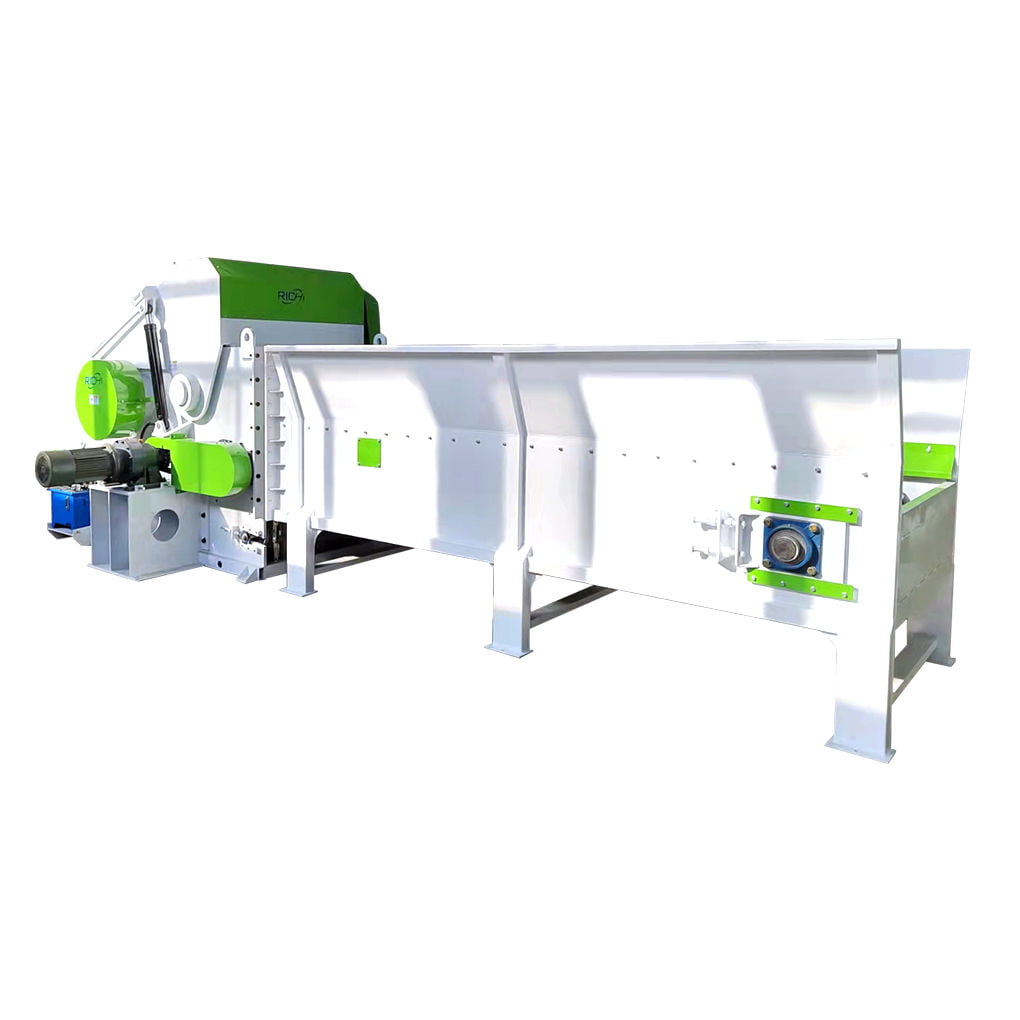
Pallet Shredder
Capacity:
3-12T/H
Main Power:
50-110KW
RICHI designs and builds key process machines, as well as complete biofuel pellet plant solutions for the global renewable energy sector.
We have the ability to manufacture and supply each and every key processing machine in the biomass pellet production line. We offer single biomass machines for production of agricultural and forestry waste pellets, solid biofuel, and waste pellets.
Different output, different Biomass pellet project cost
The output of the project is the main factor affecting the biomass pellet project cost. Because the greater the output, the greater the output of the equipment required, and the higher the price. Of course, the cost of the entire biomass pellet project is also affected by raw materials, process design and equipment selection. Therefore, there is also a situation where the cost of some 20t/h pellet projects may be lower than the cost of 10t/h pellet projects.
Generally speaking, based on RICHI’s project data over the past few decades, we can provide you with a reference range for the cost of biomass pellet projects:
- 1-1.5T/H Biomass pellet project cost: 50,000-200,000USD
- 2-2.5T/H Biomass pellet project cost: 70,000-280,000 USD
- 3-3.5T/H Biomass pellet project cost: 100,000-380,000 USD
- 4-5T/H Biomass pellet project price: 120,000-450,000 USD
- 6-7.5T/H Biomass pellet project cost: 150,000-600,000 USD
- 8-10T/H Biomass pellet project cost: 250,000-1,100,000USD
- 12-15T/H Biomass pellet project cost: 320,000-1,300,000USD
- 15-20T/H Biomass pellet project cost: 380,000-1,500,000 USD
- …
RICHI offers an innovative and comprehensive biomass pellet plant solution tailored for the biofuel industry. Our cutting-edge approach addresses the increasing demand for sustainable energy sources.
The solution encompasses a range of crucial elements, from initial design and engineering to manufacturing and installation, ensuring a seamless integration into the biofuel pellet production process.
Why start biomass pellet project?
- Low cost, as pellet prices remain competitive compared with fossil fuels, which are more sensitive to market fluctuations.
- It is possible to use renewable fuels in the form of wood pellets or briquettes.
- High energy density of pellets enables simple fuel logistics, which reduces the environmental impact.
- It’s a green choice. Replacing an old boiler with a pellet boiler significantly reduces CO2 emissions from district heating and process steam. Switching to a pellet plant is good for the environment.
- Startup is fast and easy in comparison to other types of biofuel plants. The biomass pellet project cost reacts quickly to load changes, making it an excellent solution for a peak load and back-up plant.
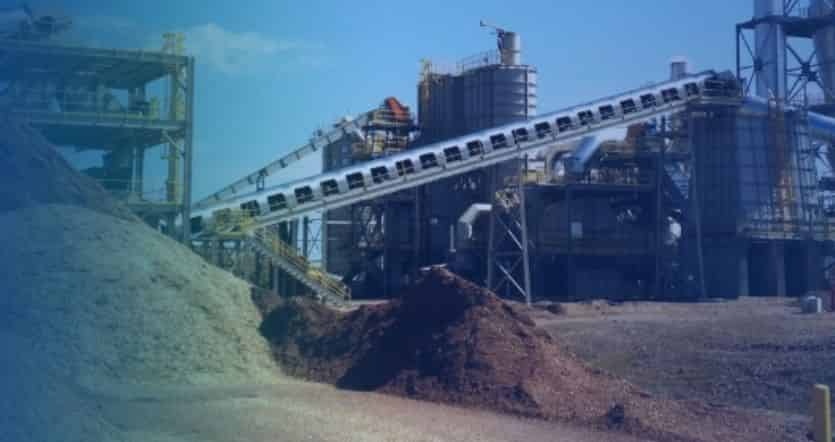
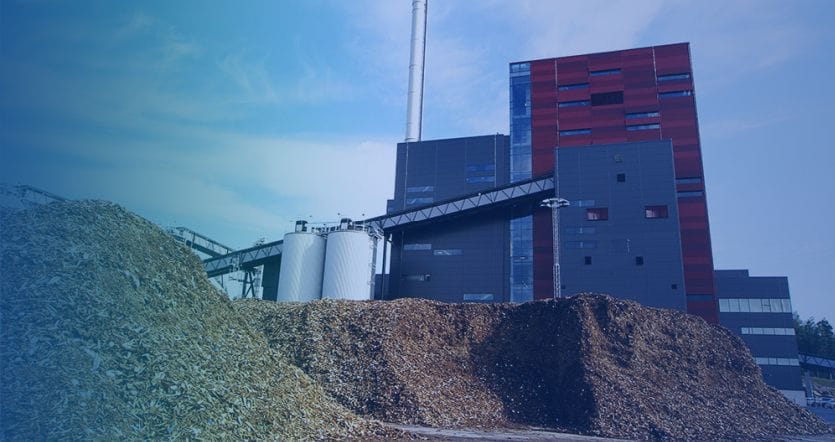
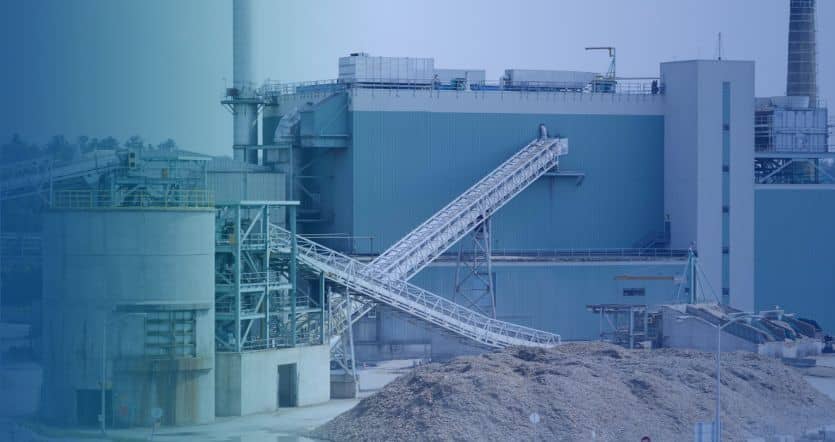
In addition, the construction of a feed mill factory may also involve some special links, such as the procurement and storage of raw materials, monitoring and quality control of the production process, etc. During the production process, attention must also be paid to the crushing and granulation of raw materials to ensure the quality and safety of the feed.
For the construction of animal feed factory projects, environmental protection and safety requirements also need to be taken into consideration, such as providing environmental protection certificates if there are environmental protection requirements.
FAQs of biomass pellet project cost

What does the processing cost of biomass pellets include?
- The processing costs of biomass pellets generally include: direct materials, direct labor, and manufacturing expenses.
- Direct materials refer to various raw materials and main materials, auxiliary materials, outsourced semi-finished products, spare parts for repair, packaging materials, fuel, etc. that can constitute the product entity or contribute to the formation of the product.
- Direct labor refers to the wages of production workers directly engaged in product manufacturing, including:
- Basic salary and wage-based bonuses, allowances, labor insurance benefits and various subsidies, etc.
- Manufacturing expenses refer to various indirect expenses incurred by an enterprise to produce products and provide labor services, including: wages and wage surcharges, depreciation fees, repair fees, machine material consumption, amortization of low-value consumables, labor protection fees, water and electricity expenses, office expenses, travel expenses, downtime losses during seasonal and repair periods, and other expenses that cannot be directly included in the production cost of the product. (Find RICHI on YouTube)

What does the construction and installation cost of a biomass pellet project include?
Components of factory construction and installation costs
There are many factors that make up the cost of factory construction and installation, the main factors include: land costs, architectural design, building materials, construction, decoration, equipment configuration, environmental maintenance, etc.
- Land cost: Site selection and land purchase are an important part of the biomass pellet project construction cost. The size of the land required, the area where the land is located, and the land price will all affect the construction cost.
- Architectural design: Architectural design accounts for a relatively small proportion of the cost, but it is still one of the key factors. The architectural design first determines the appearance, internal structure, functional layout, etc. of the factory building, which directly affects the later construction, decoration, equipment configuration, etc.
- Building materials: The selection of building materials will have a great impact on the construction and installation costs of the biomass pellet project. The quality, price, and quantity of the building materials will directly affect the quality and cost of the factory.
- Construction: Construction is an important part of the biomass pellet project construction and installation costs, which directly affects the construction quality and construction period. At the same time, the costs of labor, materials, equipment, etc. are also important factors that constitute the construction cost.
- Renovation and decoration: The later decoration and decoration costs of biomass pellet project construction and installation costs should not be underestimated. It includes decoration and decoration of floors, walls, ceilings, doors, windows, sanitary ware, etc. Among them, labor costs, material costs, etc. are important factors.
- Equipment configuration: Equipment configuration costs will also have a great impact on the cost of biomass pellet project cost, because the type, quantity, and quality of equipment will affect the quality and construction cycle of the construction project.
- Environmental maintenance: Environmental maintenance costs also have an impact on factory construction and installation costs, including landscaping, purification equipment, sanitation facilities, etc.
2. General range of factory construction and installation costs
The construction and installation costs of different types of biomass pellet factories also fall into different ranges. Generally speaking, the biomass pellet project cost ranges from tens to thousands of dollars per square meter. In different countries and regions, the use of different factory building types will affect the construction price of the factory building.
3. Cost control and savings
Factory construction and installation costs need to be controlled at different construction stages, such as optimizing land selection, rational utilization and allocation of building materials, and accurate selection of construction equipment. Similarly, during the construction and decoration process of factory buildings, quality control, reasonable construction, and avoidance of waste can also play a certain role in biomass pellet project cost savings.
biomass pellet project video
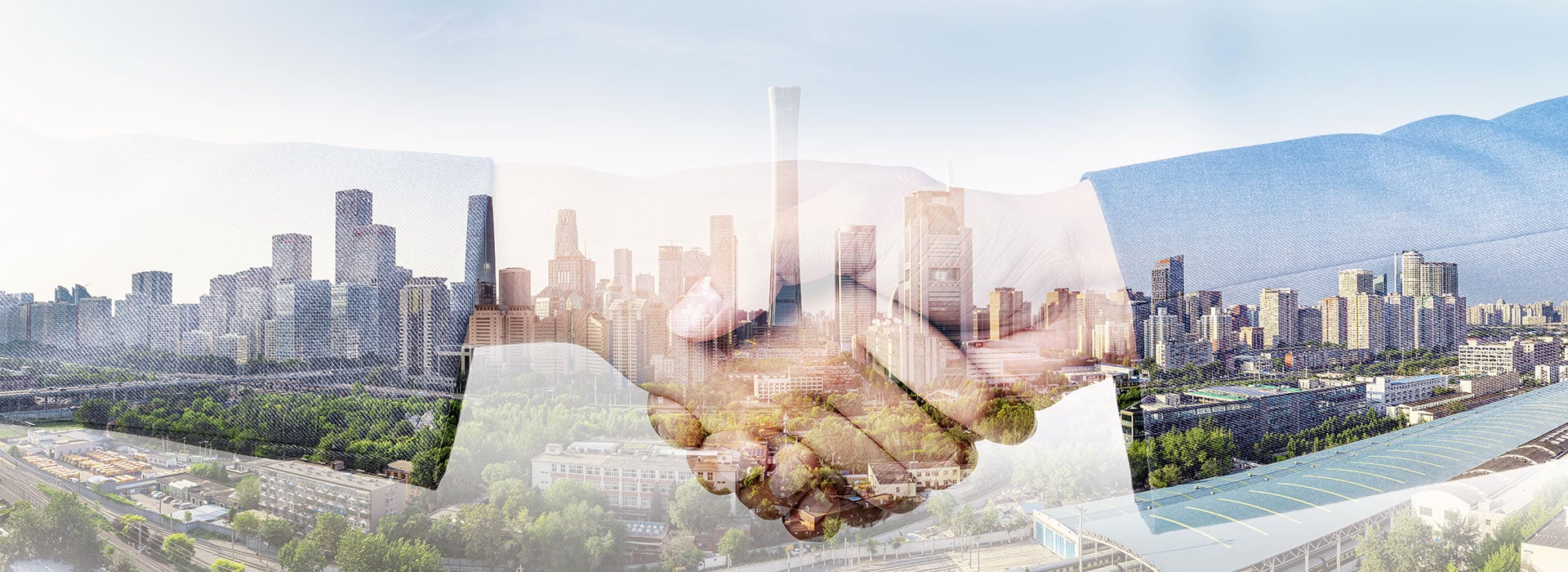
Customize your biomass pellet plant, get biomass pellet project cost
RICHI’s biomass pellet plant solution starts with efficient feedstock handling and preparation, optimizing the raw material for conversion. The advanced pelletizing technology ensures high-density pellets with consistent quality, maximizing energy output. Moreover, our expertise in process automation and control systems enhances operational efficiency, minimizing human intervention while maintaining optimal performance.
This solution also emphasizes environmental sustainability. RICHI’s biomass pellet project design incorporates state-of-the-art emission control systems, reducing the environmental impact of the biofuel production process. The company’s commitment to post-installation support guarantees smooth operations and facilitates troubleshooting.
In essence, RICHI’s biomass pellet project solution offers a comprehensive package for the biofuel industry, addressing technical, operational and environmental aspects cohesively.
No matter what your raw materials are, whether you want to use concentrated raw materials in a production line, contact us for a complete biomass pellets production line solution and biomass pellet project cost!
Why Richi Machinery?
At Richi Machinery, we believe there’s no substitute for experience, nd we have well over 25 years of it.
We have been in business for 25+ years.
Our long-term business strategy lends stability to our client’s biomass pellet projects.
We are innovators.
We don’t stand still—we are continually finding ways to improve the design and biomass pellet project construction process to add value and save you money.
We are a lean organization.
Our clients work with just one project manager and one biomass pellet project superintendent who have the authority to make decisions. This minimizes mistakes and expedites jobs, saving everyone time and money.
We have key employees with significant experience in the industry
Our key employees have an average of 10 years with the company. As a result, we deliver our jobs faster and help our clients get a return on their investment sooner than other companies in our industry.
We understand the importance of communication
We want to make sure our clients know what’s going on at all times. We anticipate problems to minimize client risk, and we listen to ensure that client needs are accurately reflected from proposal to biomass pellet project completion.
We understand customer satisfaction includes being cooperative
We work as a team with the owner, subcontractors, and suppliers. We strive to make the construction process a pleasant experience for the client.
We are committed to quality
We see each biomass pellet project as a reflection of our values and build each one as though it were for ourselves. We strive to do it right the first time, improving the investment value of our client’s property.
We work safely
We have minimal lost time due to injuries and our insurance costs are lower, which saves our clients money from biomass pellet project cost.
We work in tough environments
We understand the challenges, maintain flexibility in our work schedule, and minimize errors in order to deliver your biomass pellet equipment on time and on budget.
